Location
Our Idaho Location
Located in Boise, Idaho, Northpoint Recovery is proud to offer quality drug and alcohol detox as well as alcohol and drug rehab in the Treasure Valley.
- Idaho
2335 E. State Ave,
Meridian, ID 83642
Disclaimer: This article is not intended as a substitute for the counsel of a qualified physician or licensed therapist. This content should be used for purely informational purposes. Please consult your doctor if you have further inquiries on this subject. We intend to impart the most accurate and recent information but cannot make any guarantees.
If the words above resonate inside you with an uncomfortable truth, or if you see them reflected in the actions and sentiments of someone close to you, it may be time to seek help. When contemplating the possibility of recovery from the chasm of alcoholism, many feel that there is no possibility of climbing out of the abyss. There is always hope, however; millions of people have recovered from alcoholism. Sometimes the most difficult step is admitting that it's time to try.
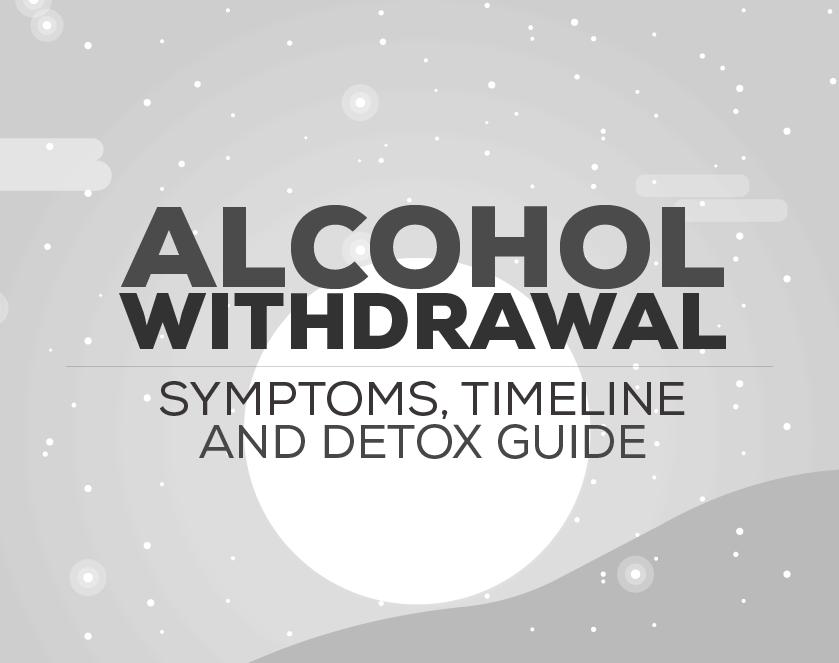
First and foremost, it is important to recognize alcoholism, also known as Alcohol Use Disorder, as the medical condition that it is. You wouldn't blame someone for developing a deadly form of cancer, so why condemn an alcoholic as a criminal or masochist? This disease is not a choice; it is an illness. Recognizing this fact is absolutely necessary in order to begin the journey towards recovery and sobriety.
The journey will not be an easy one; recovery from Alcohol Use Disorder is described by many as "the hardest thing I have ever done." Because it is so very difficult, you'll need to make sure that you have the right information and support system in place before you begin. The first leg of the recovery journey is alcohol detox.
Alcoholism is a very serious condition that affects so many people in the United States. In fact, according to the National Institute on Alcohol Abuse and Alcoholism:
Although they are often confused for the same thing, alcohol detox is a separate process from alcohol rehabilitation. Detox is the process of ridding your mind and body of the toxic effects brought on by long-term alcohol abuse. During alcohol detox, the body of an alcoholic will undergo alcohol withdrawal and end its dependence to alcohol, also called ethanol.
Alcohol rehab, on the other hand, describes the longer undertaking of treating psychological dependence to alcohol, as well as the causes and effects of alcohol addiction.
While detox is is a temporary program that lasts only as long as alcohol withdrawal, rehab is the long-term treatment of Alcohol Use Disorder and (hopefully) helps the patient to achieve a healthy, sustainable, and sober lifestyle.
Since you have read this far, it is safe to assume that you or someone you care about is suffering from the degradations of alcoholism. Continue reading to learn about the process of alcohol detox, the information and preparation you will need on hand before you begin, and what to expect during and after an alcohol detox program. The first step is alcohol detox, and the final reward is the rest of your life.
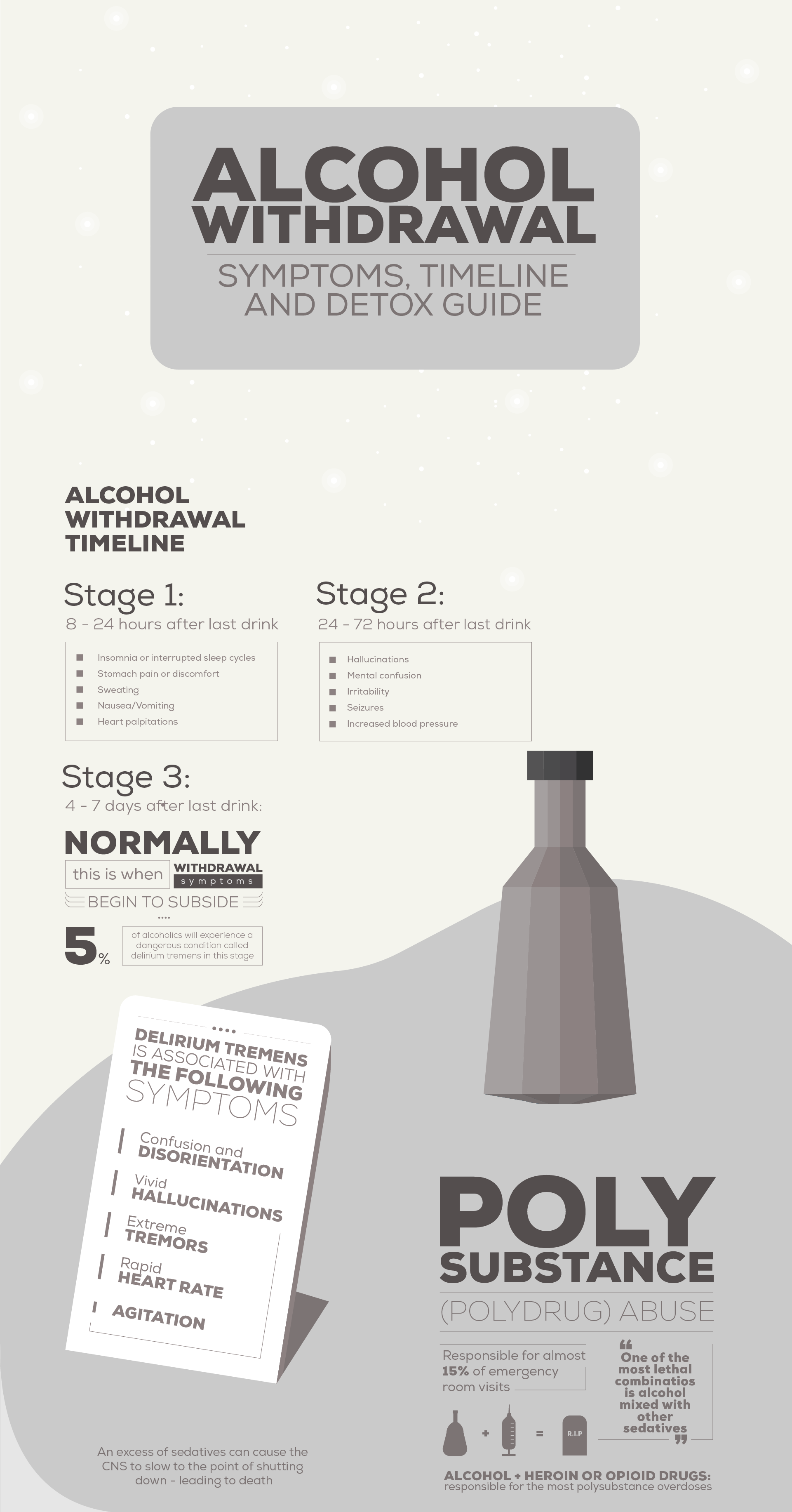
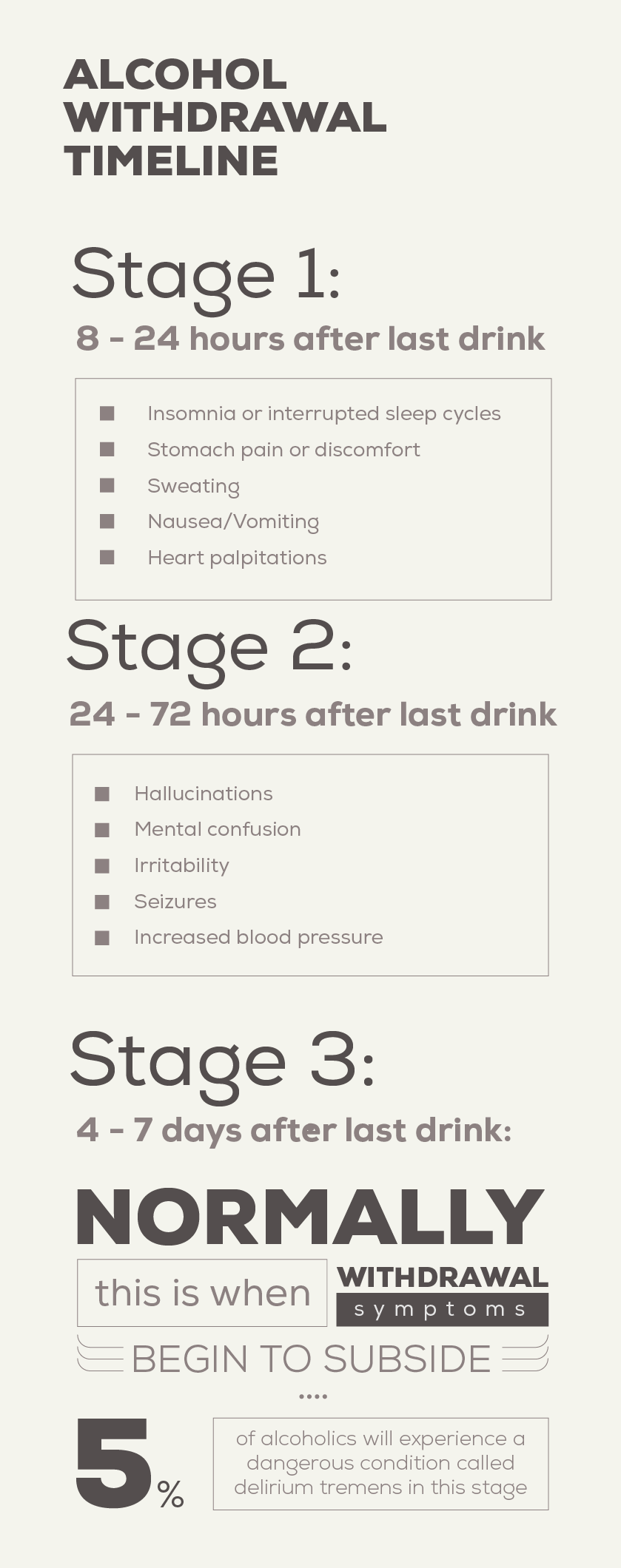
Alcohol withdrawal happens when the brain and body have forgotten how to function normally without the presence of alcohol. The body works to rid itself of toxic quantities of ethanol and reestablish chemical balances in the brain, a process that results in a wide array of painful symptoms. Here is a basic timeline of the alcohol withdrawal process, although it may vary from one case to another:
1st Stage: 8 - 24 hours: As the first stage of alcohol withdrawal sets in, the following symptoms take place:
2nd Stage: 24 - 72 hours: Although it varies according to the severity of the alcohol addiction, the second stage of withdrawal may be marked by the following:
3rd Stage:4 - 7 days: If all is going well (or as well as it can be) this stage is the point when withdrawal symptoms begin to abate. Although intense alcohol cravings and psychological side effects may continue long after alcohol detox, a rehab program is the next step to deal with these lasting effects. The main risk at this point is a dangerous condition called delirium tremens;5% of alcoholics will experience this condition during the third stage of withdrawal.
Delirium tremens is accompanied by the following symptoms:
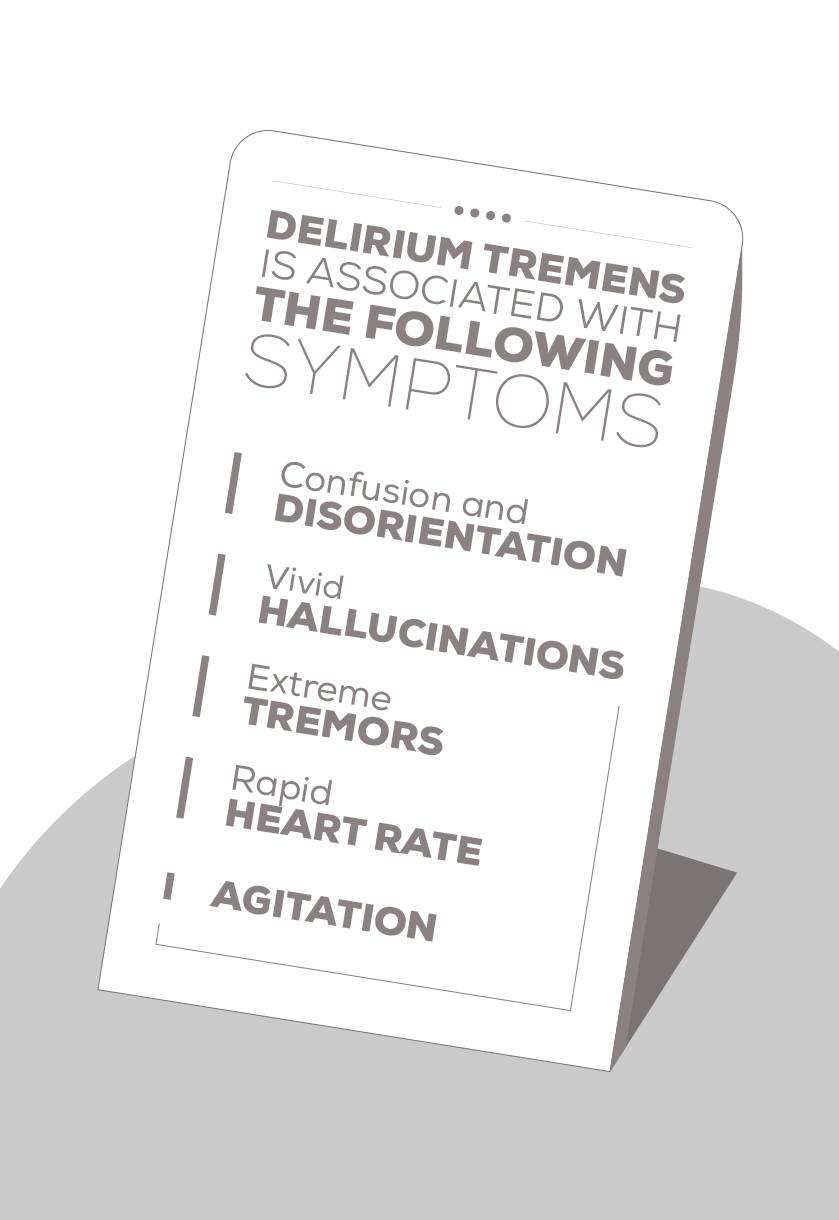
As many as 15% of those who develop delirium tremens die from its symptoms. This is the primary reason that medically trained professionals should be close-by during alcohol detox. Someone who is trained to recognize the signs of delirium tremens could detect and treat the condition before it became deadly.
People with Alcohol Use Disorder generally drink anywhere from 4 to 10 or more alcoholic drinks each day. This means that their bodies are rarely (if ever) given the chance to cleanse aways the toxins that run through their veins. When an alcoholic suddenly becomes sober, the body is thrown into a state of confusion and chaos.
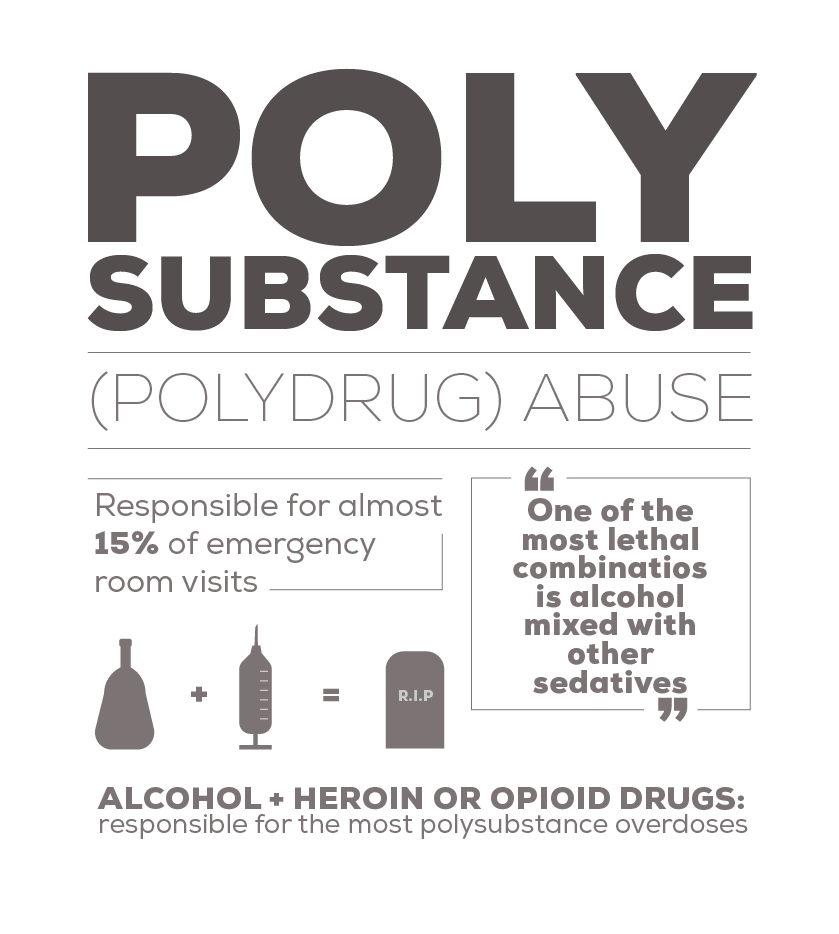
First, the brain is inundated with excitatory chemicals that have no counteracting sedative neurotransmitters to balance them out. This imbalance causes the mental and emotional symptoms associated with withdrawal, like muddled thought processes, anxiety, insomnia, seizures, and mood swings.
Meanwhile, without the pain-relieving effect of ethanol to soothe them, the esophagus and stomach begin to ache in response to the corrosive effect of long-term alcohol abuse. The liver and kidneys kick into high gear, working to cleanse toxic ethanol from the blood, organs, and tissues. This process results in a variety of aches and pains, heavy sweating, vomiting, headaches, and heart palpitations.
If it sounds like a harrowing experience, that's because it is; however, alcohol detox and withdrawal are the most important steps in eradicating physical dependence to alcohol. Once the physical addiction has been defeated, you will be ready for the psychological rehabilitation process.
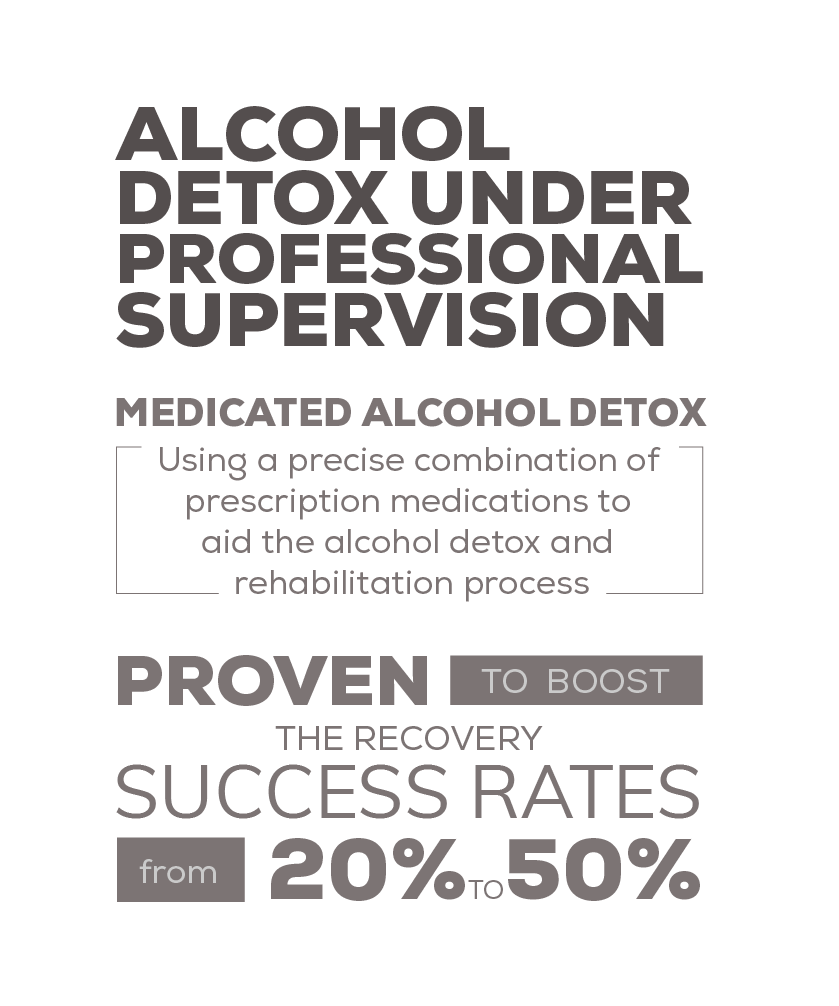
The short answer is no, it is not recommended to perform alcohol detox at home. Yes, some people have done it and a few have even completed the process successfully, but the vast majority of those who try, fail. Alcohol detox is so unpleasant and difficult that most who attempt to do it at home cannot resist the temptation to relieve the pain with "just a touch" of alcohol. Of course, this counterproductive methodology almost always ends in failure.
In addition to the ever-present temptation of drinking, there are a range of other reasons that detoxing from alcohol at home may be a bad idea, or even dangerous:
These "magic potions" may be advertised as an easy out - a way to decrease or hasten the alcohol withdrawal process - but alcohol detox kits are usually less than effective. There is even some evidence that they could be detrimental to health.
Alcohol detox kits come in several forms, both chemical and herbal, but are often intended for the sole purpose of masking alcohol or other substances from showing up in sobriety tests. Their claims to relieve alcohol withdrawal symptoms have not been supported in any study. In fact, the use of such products has been shown to potentially produce ill side effects, like stomach pain or psychosis.
The Primary Care Companion for CNS Disorders specifically proscribes the use of alcohol detox kits, recommending instead FDA-approved medications or herbal treatments from a certified treatment facility during alcohol detox.
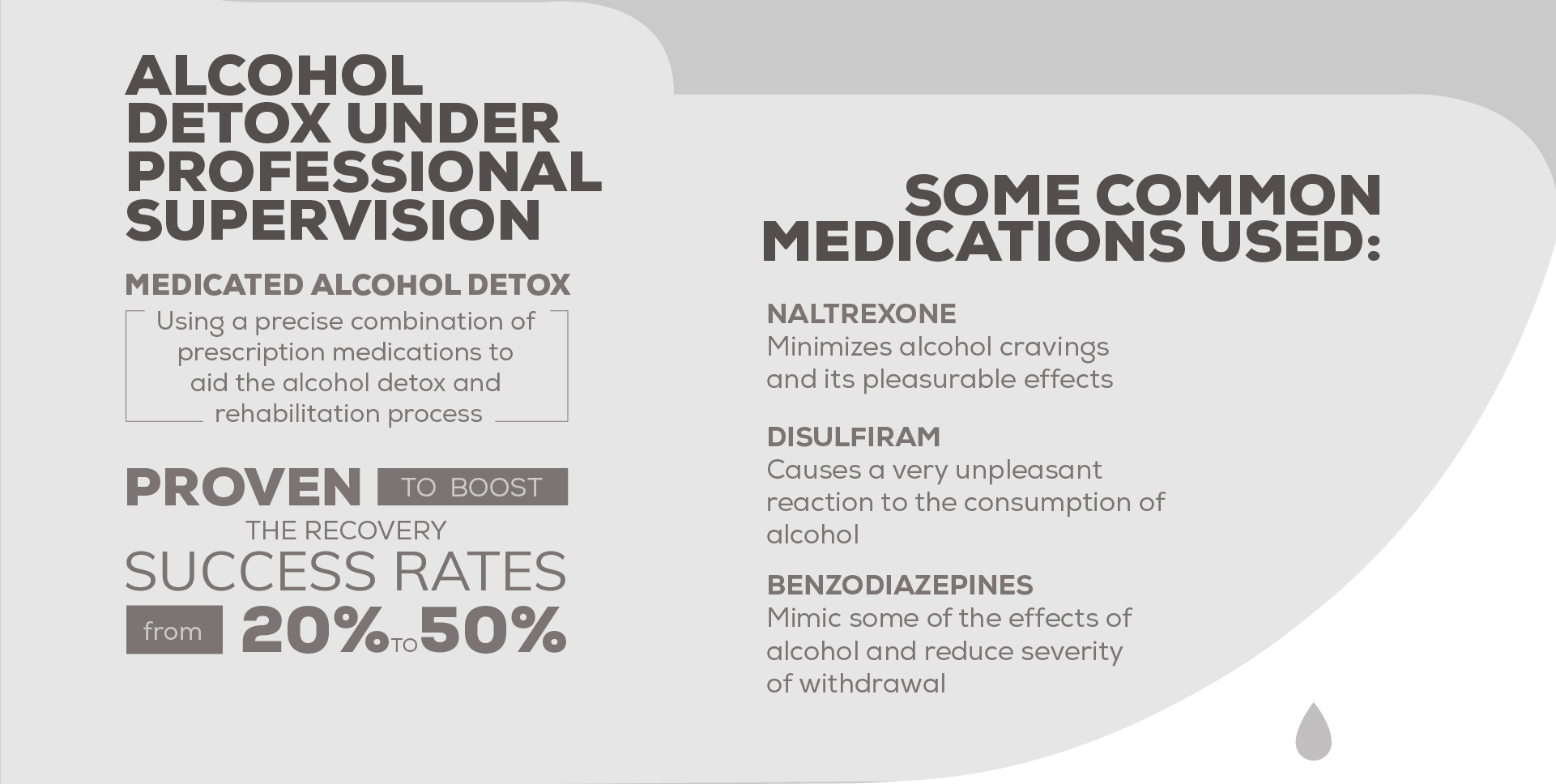
Under the supervision of a medical doctor, a combination of prescription medications may be used to relieve some symptoms of alcohol withdrawal and assist in the alcohol detox process. This method may boost the recovery success rate from the standard 20% up to 50%. Here are a few commonly prescribed medications:
If implementing a regimen of the above medications, one would need close supervision by a medical professional. Sometimes this supervision in combination with the expensive cost of the prescriptions can deter a budget-conscious recovering alcoholic. However, some outpatient programs offer these medications as well as a much more attractive fee.
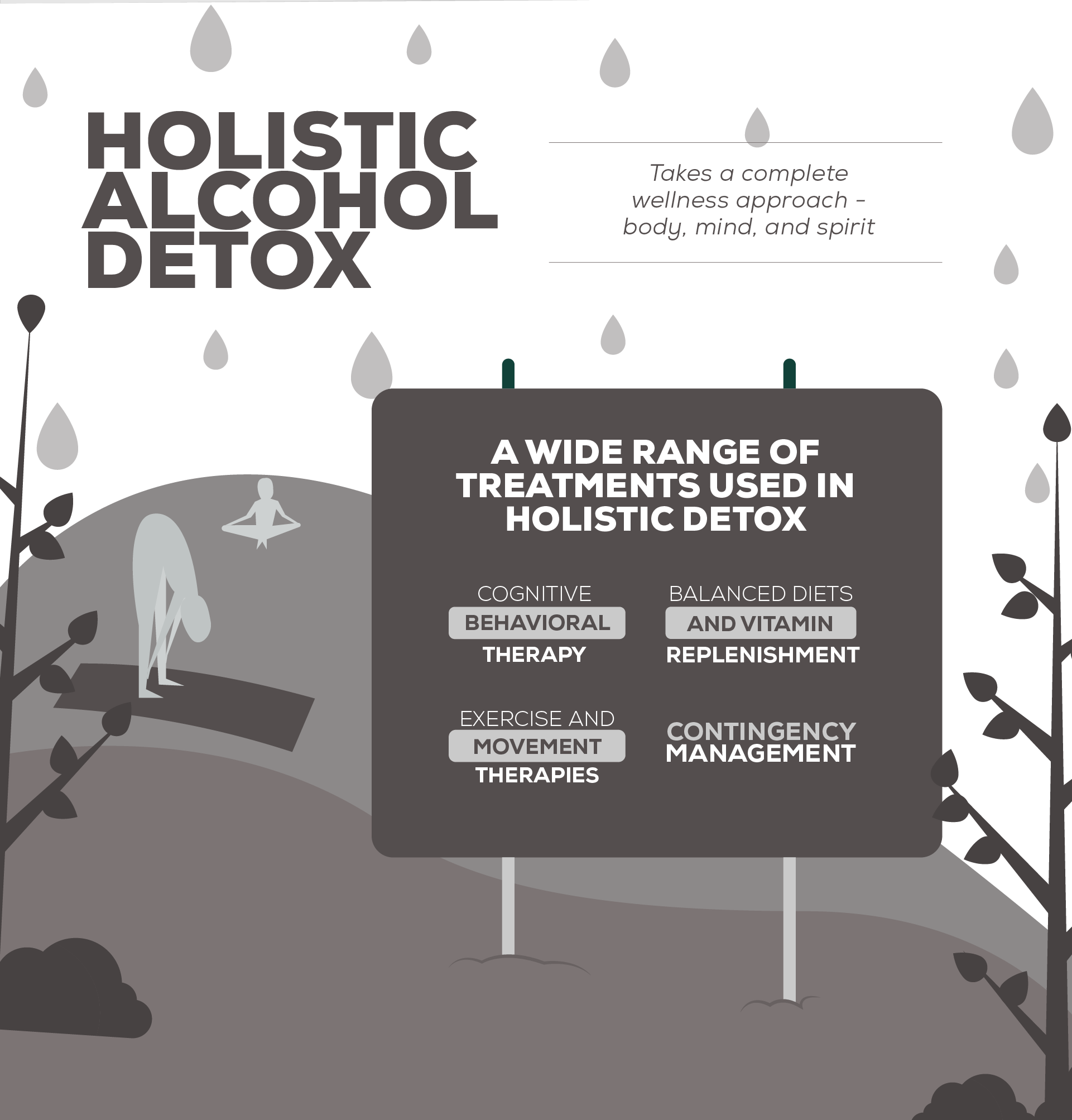
While medicated detox only addresses withdrawal symptoms and cravings, a holistic alcohol detox program focuses on whole-body healing. In addition to treating physical alcohol dependence, the holistic approach seeks out the causes and effects of addiction, attempting to treat the body, mind, and spirit as a whole unit in the process.
This level of integral healing requires a range of different types of treatment and therapy, such as:
The holistic program may take longer, but usually addresses a much wider range of issues than a standard alcohol detox program. Like medicated detox, it requires intensive supervision and therapy and therefore, it's not cheap. Some holistic programs offer outpatient treatment however, which may be your first choice if budget is an issue.
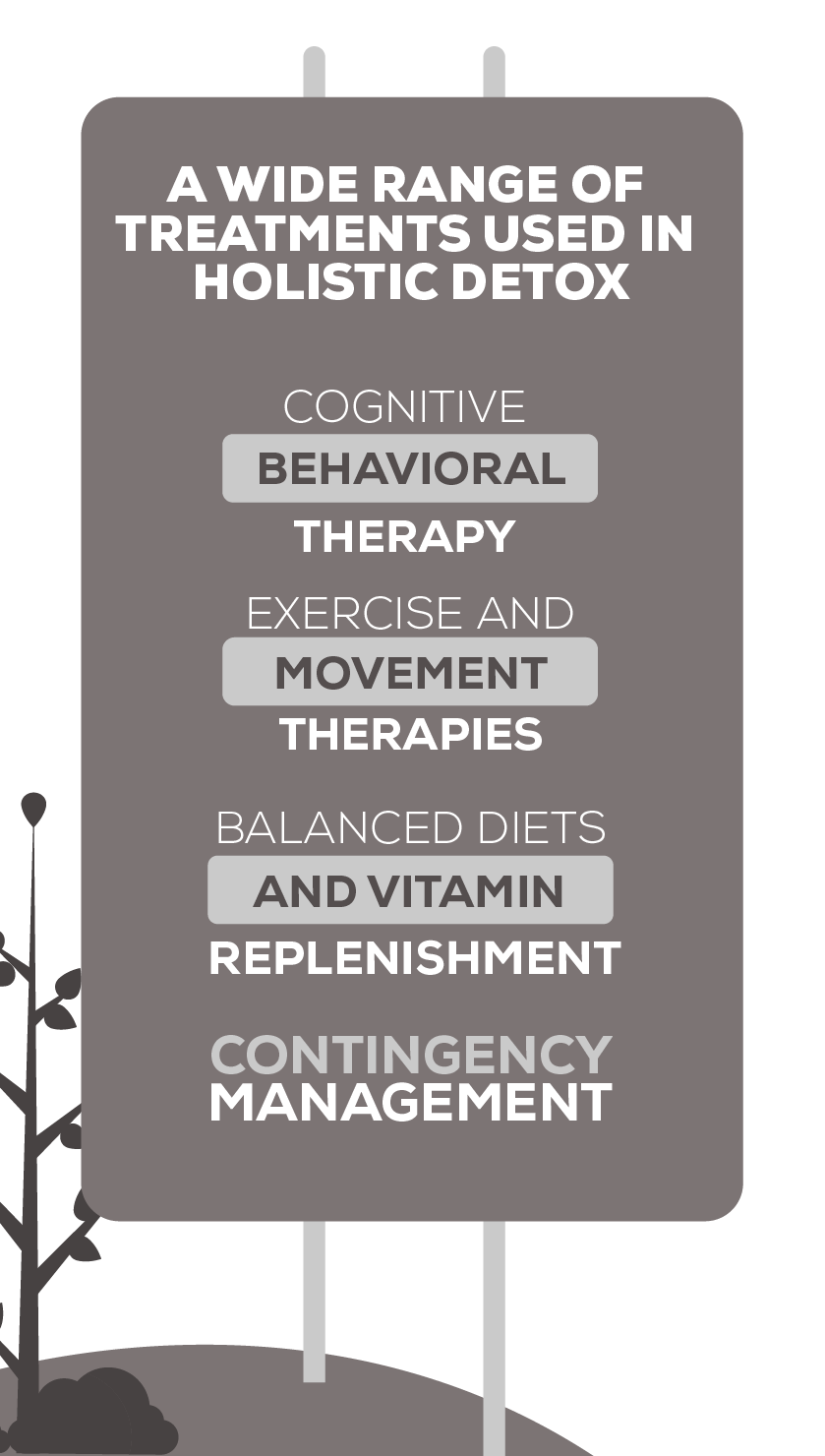
The type of alcohol detox program you choose will depend largely on the severity of your addiction and the limitations of budget. Here are the most common options:
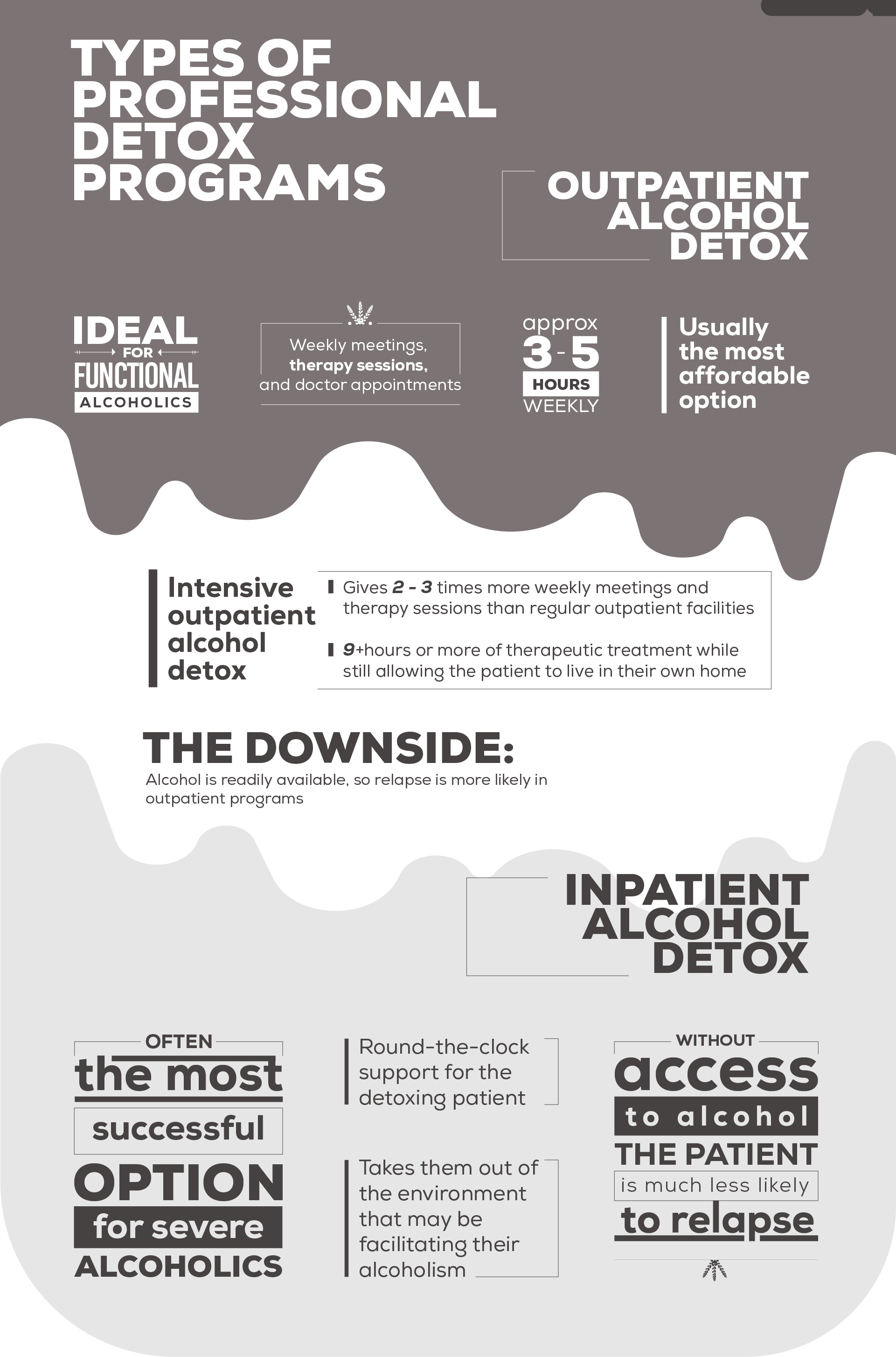
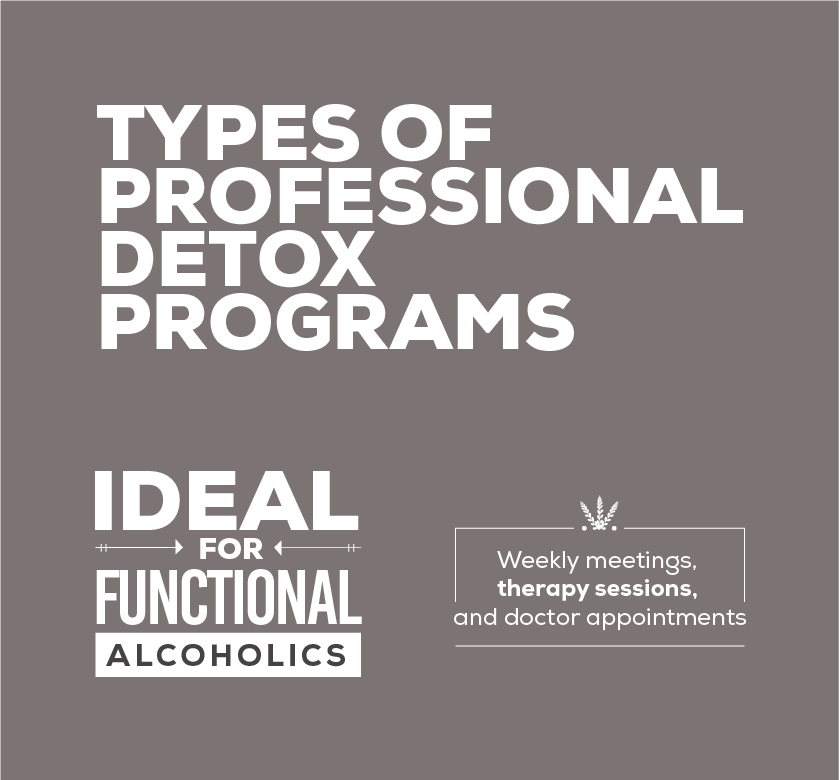
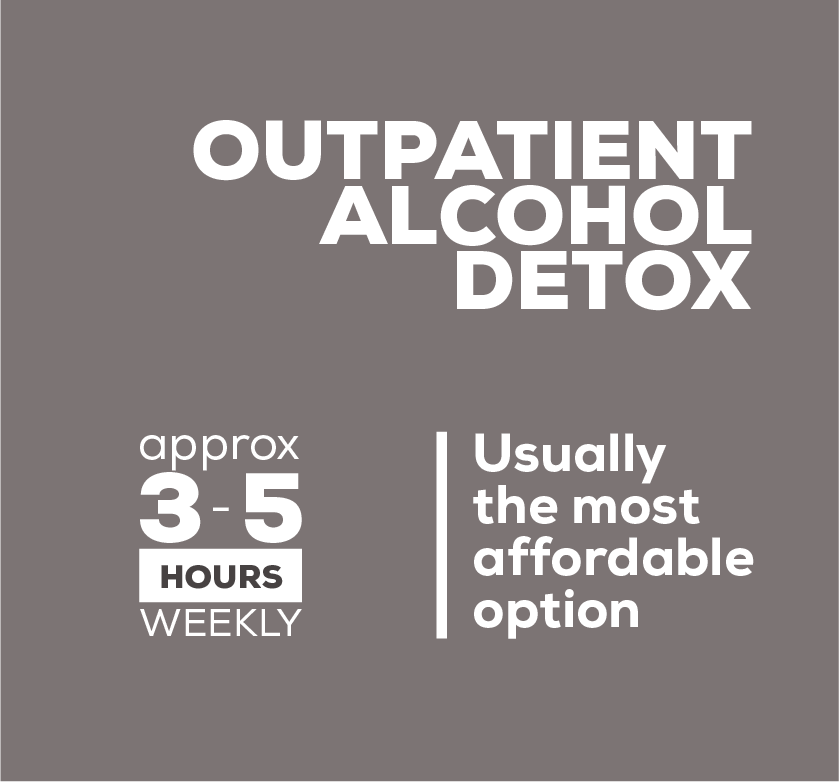
Offering 3-5 hours of therapy and treatment each week, outpatient programs are popular for functional alcoholics and those who wish to stay within a limited budget. An outpatient program allows the patient to continue with regular work and social schedules while living at home. Because of the easy access to alcohol in this setup, relapse is more common during outpatient alcohol detox.
While still allowing the patient to live and sleep at home, this intensive outpatient program requires 9 hours of more of weekly classes and therapy sessions.
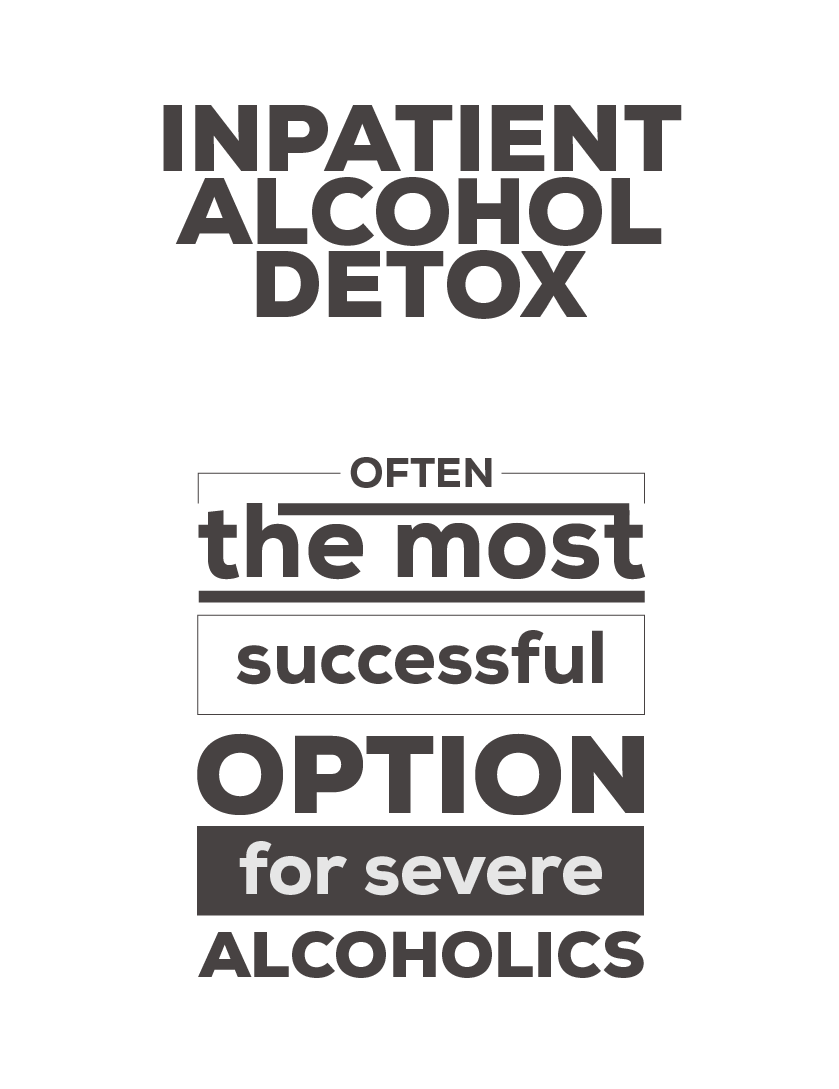
Usually the most successful option for alcohol detox, inpatient programs are also the most expensive. The inpatient option takes the alcoholic out of their environment completely, which may make for higher success rates. Inpatient alcohol therapy offers 24/7 support for the patient while they undergo alcohol withdrawal symptoms. The most significant aspect of this option is the lack of availability to alcohol. Relapse is much less likely when there is no access to alcohol.
Alcohol withdrawal is famous for being one of the worst withdrawal processes to go through. This is because of what alcohol does to the brain. The alcoholic brain has become accustomed to the steady influx of ethanol and its sedative effects. In response, it has answered with a response of excitatory neurotransmitters in an attempt to keep some balance.
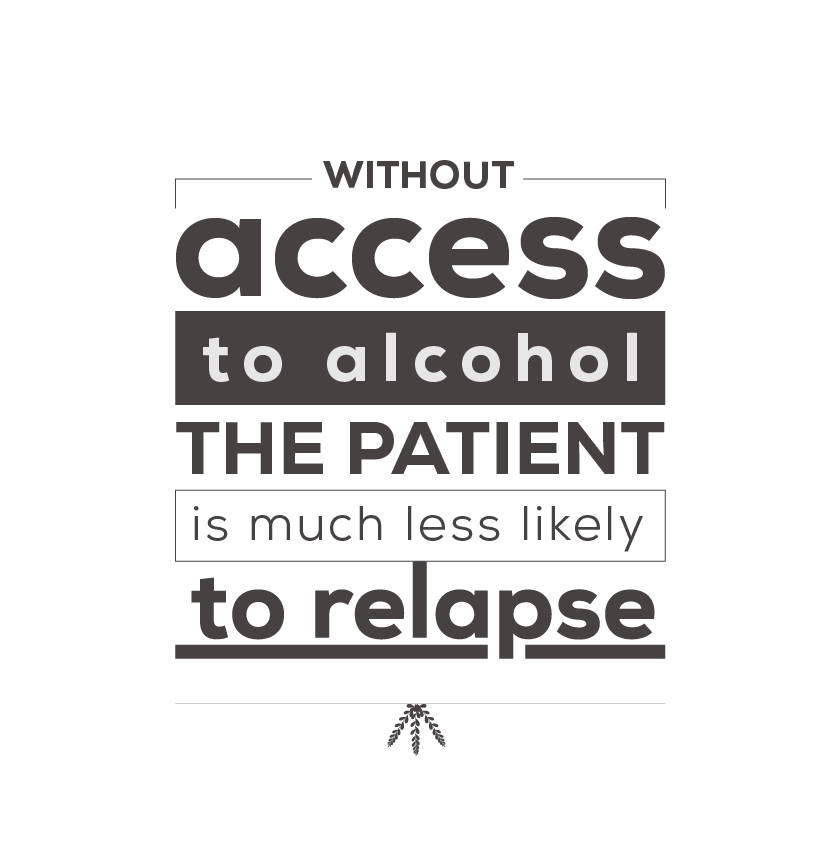
Take away the ethanol, and the brain is suddenly flooded with excitatory neurotransmitters - the very chemicals responsible for anxiety, excitement, and pain - but without any sedative neurotransmitters to counteract them. All of the brain's soothing, calming chemicals have been depleted by the constant stream of alcohol and what's left is a chaotic overabundance of stimulating chemicals. The result is a wide range of uncontrollable and agonizing withdrawal symptoms that rack the body until the brain can achieve some semblance of balance and normalcy once again.
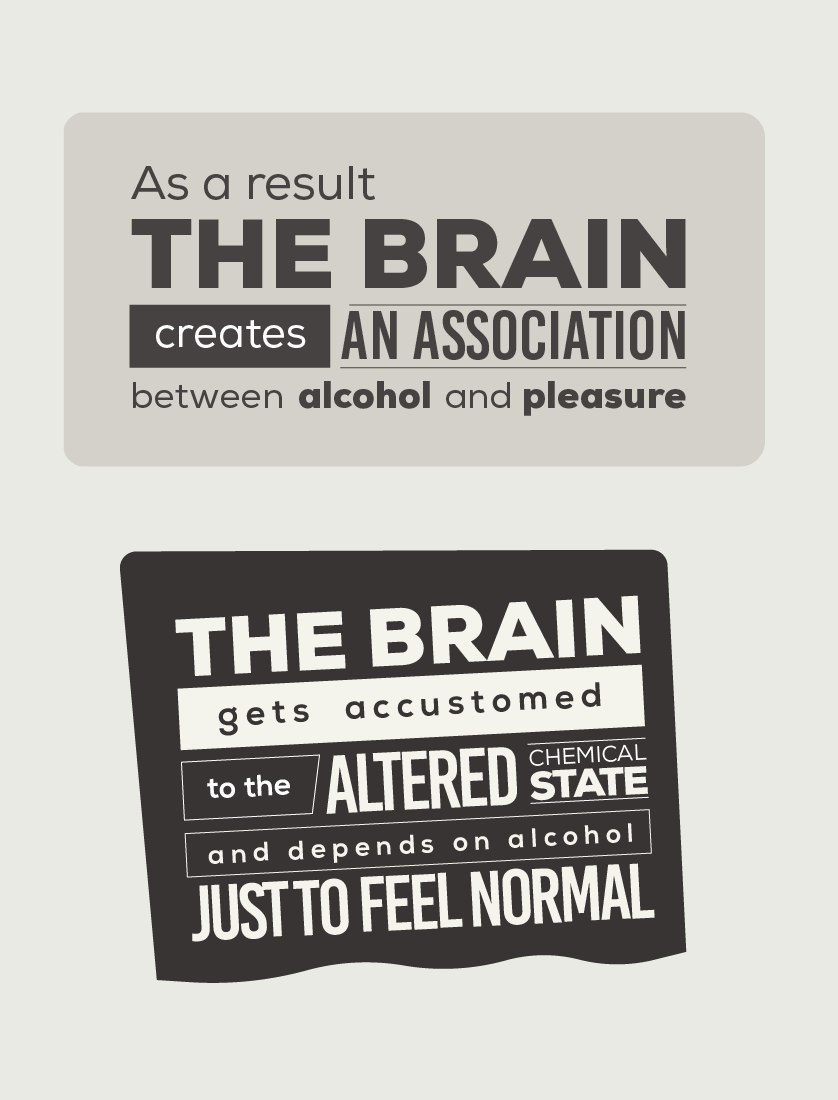
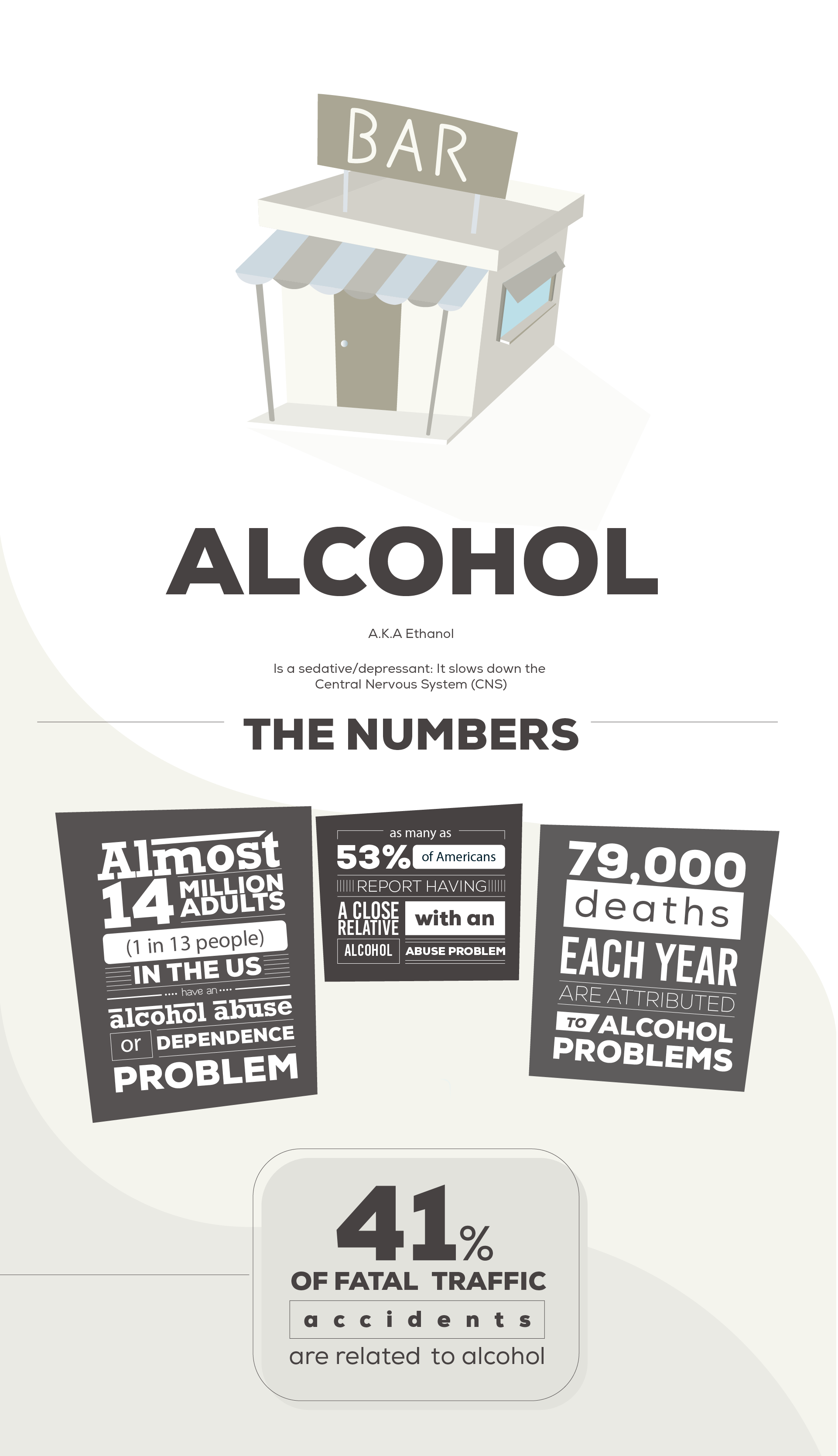
Alcohol detox only addresses the physical aspects of addiction. Once it's completed, alcohol rehab is necessary to treat the psychological aspects of addiction and the establishment of a sober lifestyle. The Substance Abuse and Rehabilitation Journal states that completing rehab and attending regular therapy can boost recovery success rates from 17% (for detox alone) to 67%.
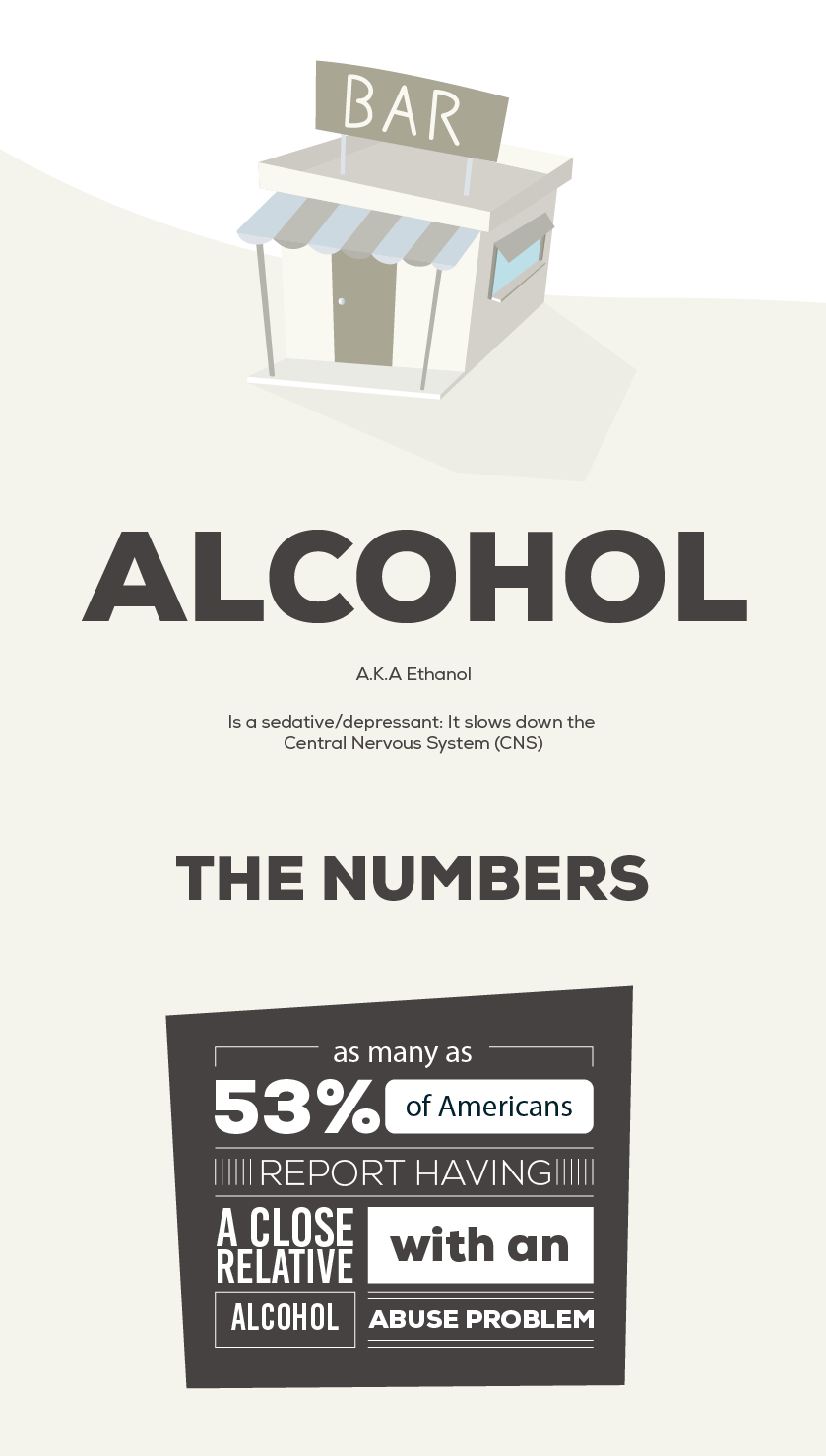
A wide range of issues are addressed during the alcohol rehab process, such as:
These topics are approached in a variety of ways that force the individual to confront every aspect of their past, present, and future. This is accomplished through group therapy, psychiatric care, family therapy, classes, and workshops. The goal of this process is to learn to live a healthy, productive life of sobriety and avoid relapse in the future.
Alcohol rehab is by no means a "cure" for alcoholism. Long after rehab is completed, a recovering alcoholic may need a strong, wide support system to stay sober. Some aftercare solutions offered by the average treatment facility are:
Support groups are key for many recovering alcoholics. Sobriety rates are much higher among those who continue to attend support groups for months or even years after rehab. In fact, many alcoholics continue to attend regular meetings for life in hopes that they will reduce the chance of relapse. Here are a few of the most popular support groups:
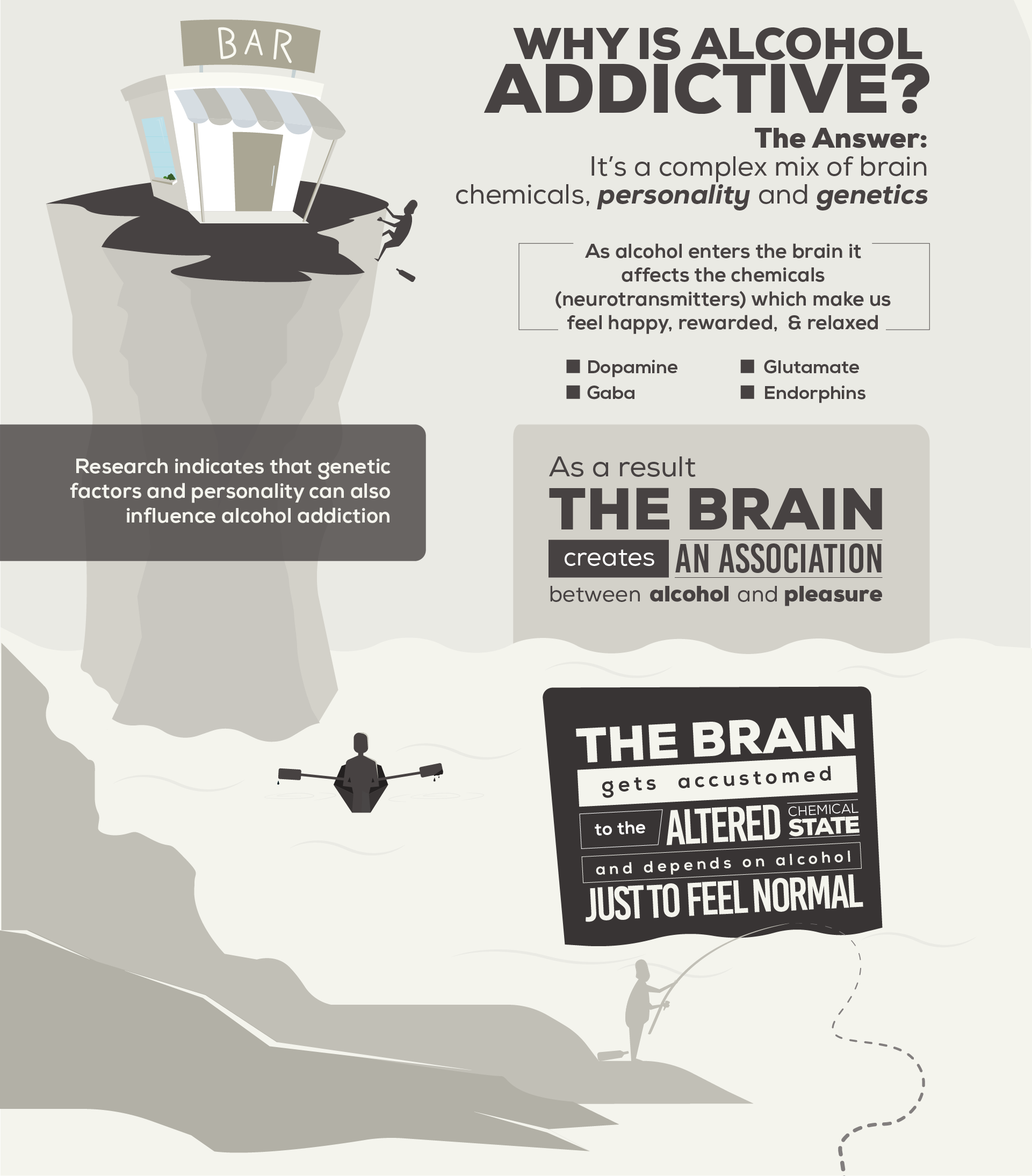
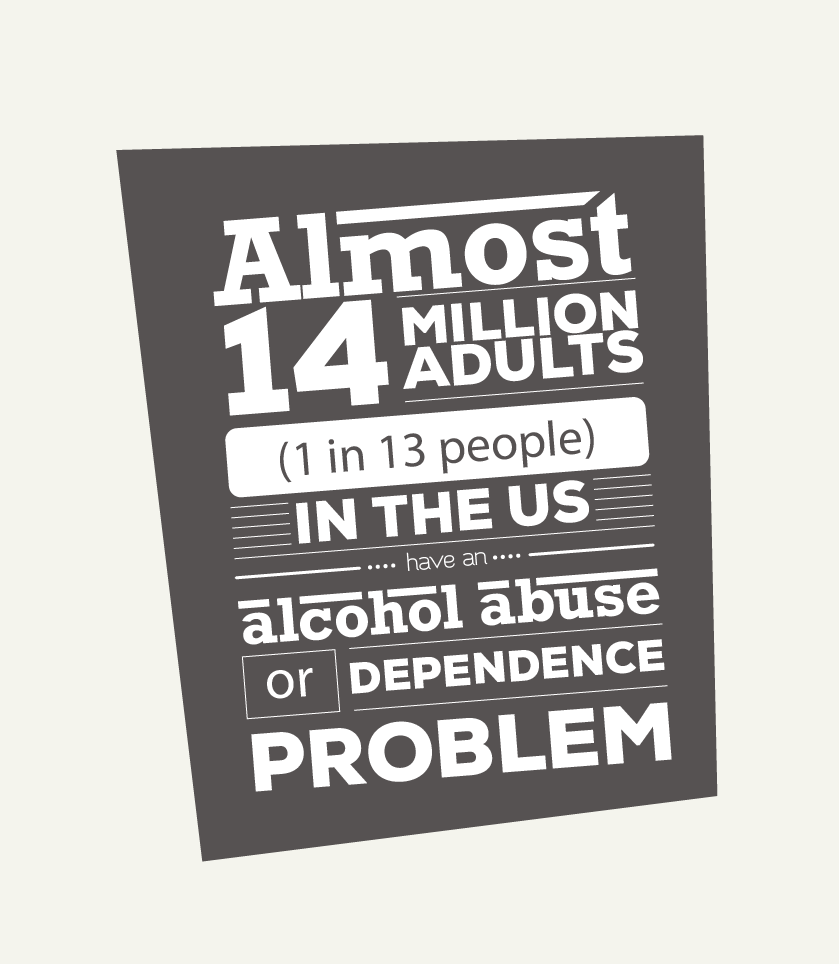
Like most addictions, alcohol addiction is caused by the disruptive effects of intoxicating substances on the delicate chemical balance of the brain. This is how it works:
The biological process above begins to take place from the very first drink, but one drink does not indicate addiction, of course. Addiction is a much longer, more involved process:
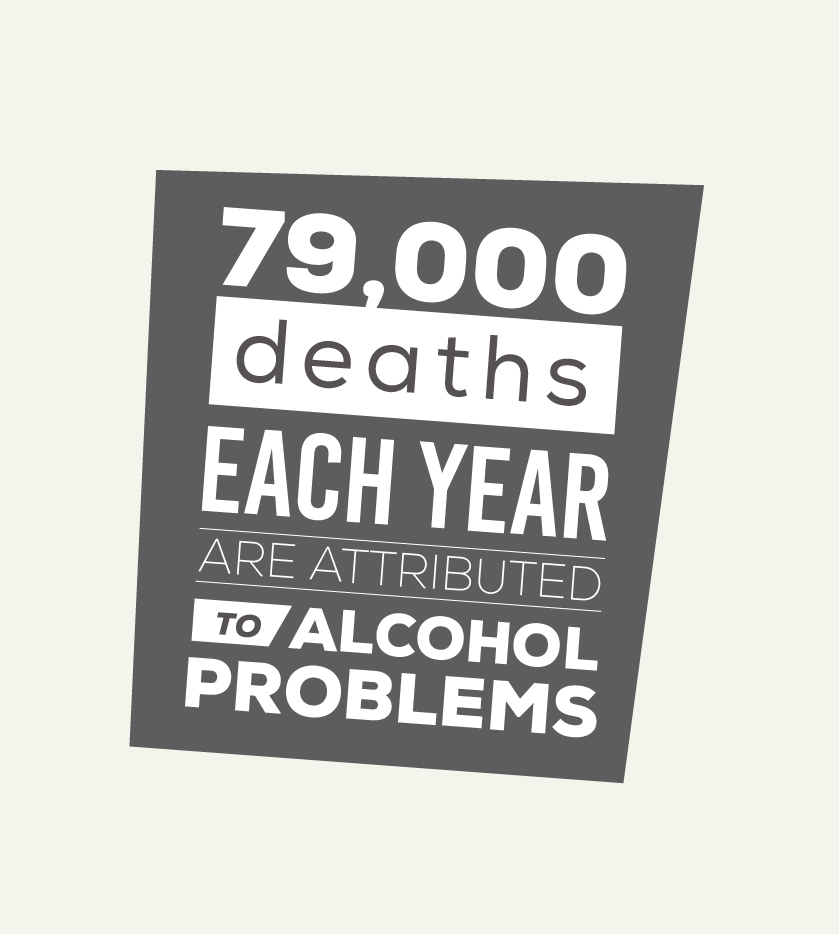
The result of this process is that the human body only knows how to function under the influence of alcohol, and when a person tries to become sober, the imbalanced brain no longer remembers how to function normally. At this point the now alcoholic will go into alcohol withdrawal - a variety of unpleasant symptoms such as hand tremors (the shakes), headaches, insomnia, stomach pain, and high anxiety. These are known as alcohol withdrawal symptoms and will only set in if the body and brain have formed a physical dependence to alcohol.
Once addiction has set in, the body will react negatively - and painfully - to any attempt by the alcoholic to become sober. The body will crave alcohol to relieve the unpleasantness of withdrawal and thus, Alcohol Use Disorder begins, ends, and begins again in an ugly, never-ending cycle.
As described above, heavy drinking over time leads to a physical dependence to alcohol, but the process is not always obvious to the alcohol abuser. There is a fine line between alcohol abuse and alcohol addiction, and it is not always easy to see when the line has been crossed.
Musician Ed Sheeran describes his descent into addiction like this, "I didn't really notice it was happening. It just started gradually happening, and then some people took me to one side and were like, ‘Calm yourself down'… It's all fun to begin with, it all starts off as a party and then you're doing it on your own and it's not, so that was a wake-up call."
Many view alcoholism as a state of being that "you either have it or you don't." This is not the case, however. Sometimes, the path to alcohol addiction happens slowly - over decades - and you don't even realize that you're dependent on alcohol until it's already too late.
One reason that this happens is alcohol tolerance - the need to drink more and more over time to achieve the same effect. Because of the chemical process that takes place in the brain in response to alcohol, a heavy drinker will need to consume more alcohol at each setting to find the buzz they crave. The steady increase is incremental however, and may not be obvious in the moment.
At some point, no amount of alcohol can produce the same euphoria that it originally induced, but once dependence has become established, an alcoholic will need to keep drinking just to "feel normal". Drunkenness is the new normal, and at this point the process of alcohol detox will be so unpleasant, it may not seem worth the effort to achieve sobriety.
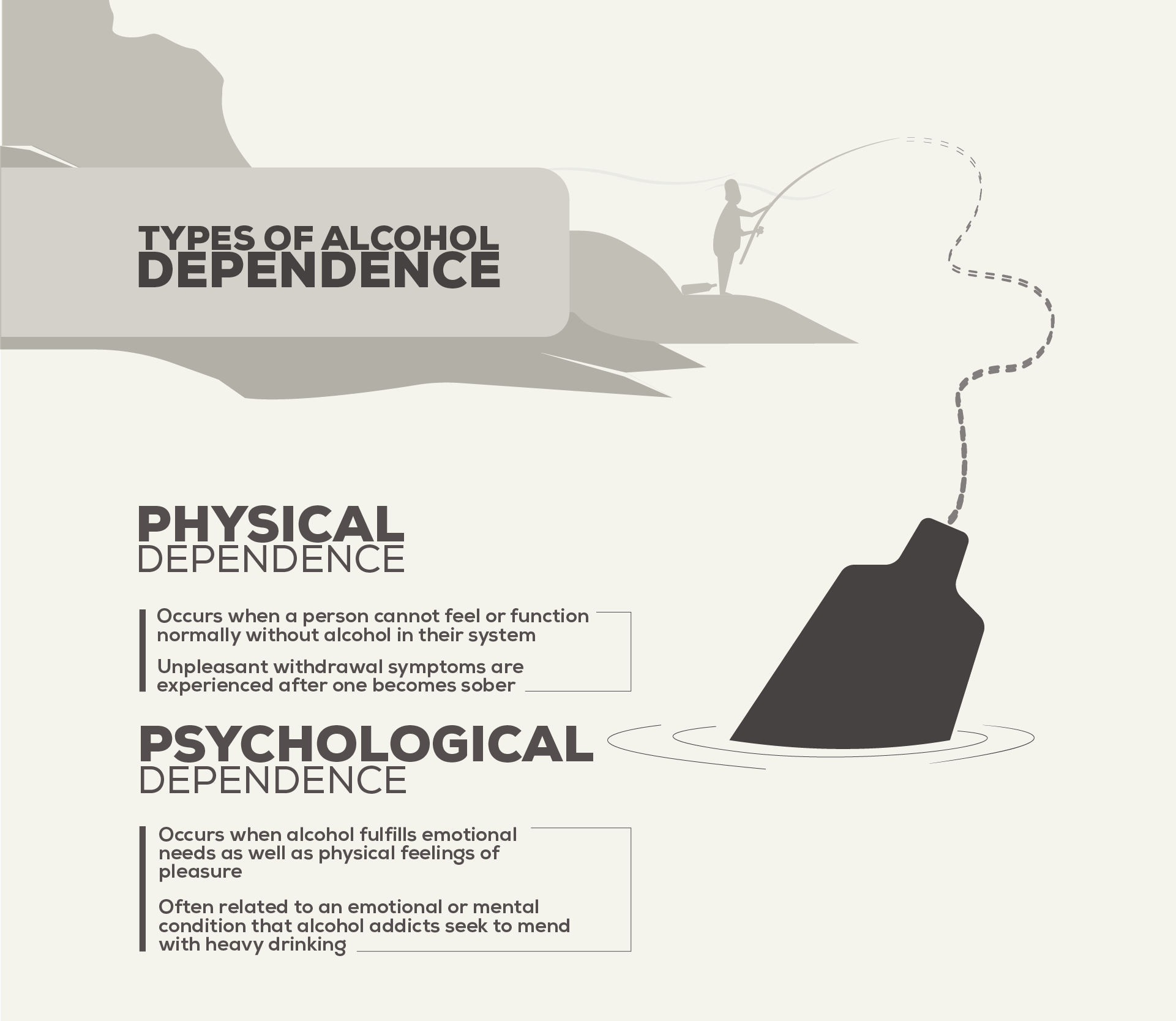
Alcohol addiction happens on two levels - physically and psychologically:
A physical dependence occurs when the brain and body are so accustomed to the presence of alcohol in the system that they can no longer function normally without it. This "new normal" is so entrenched in one's day-to-day life that they experience unpleasant alcohol withdrawal symptoms when they quit drinking. Since these symptoms are so difficult to undergo, an alcoholic will continue drinking simply to avoid alcohol withdrawal. If someone feels the unpleasant side effects of withdrawal when they become sober, then a physical alcohol dependence has already formed.
A psychological dependence is more involved and unique to each individual. Although it usually goes hand-in-hand with physical dependence, a psychological dependence may be more difficult to overcome because it stems from a deeper emotional need for alcohol. For example, someone who does not function well in social situations may drink to feel comfortable around other people, or perhaps someone with an emotional condition like depression or bipolar disorder will self-medicate with alcohol to feel better. Although a psychological dependence may not cause the physical pain of withdrawal, it can take a lot longer to resolve during the recovery process.
Do you have an image in your mind of what Alcohol Use Disorder looks like? Stereotypes of the "common drunk" often lead to misconceptions as to what alcoholism looks like and can even lead to self-denial about one's own alcohol abuse. Social and cultural norms often lead us to believe that an alcoholic is someone who:
With a few exceptions, this stereotype is largely inaccurate. While long-term alcohol abuse is certain to cause a multitude of problems, it is not always obvious or easy-to-detect. Alcohol Abuse Disorder has affected people in every corner of society, from successful business executives to doctors, schoolteachers, and highschool children. Like many other diseases, it can strike almost anyone, and most never see it coming.
"..utter financial ruin, horrendous car wrecks, injury and death. Prison sentences, wrecked marriages, degradation and humiliation far beyond anything I'd ever experienced. But as long as I continued to drink, any one of those fates could have been mine" --Michael J. Fox
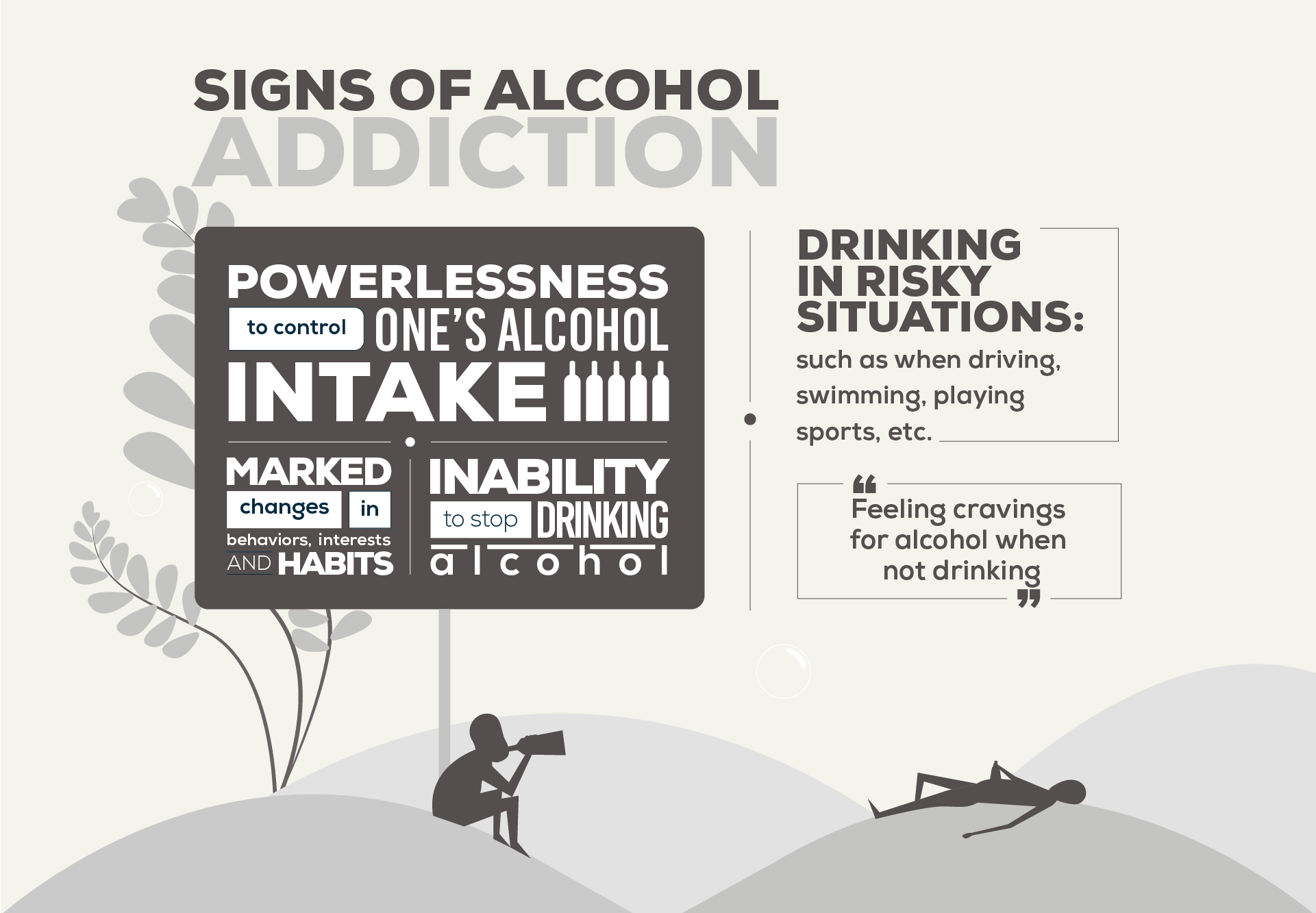
Whether you're concerned about your own alcohol use or that of someone you know, the Diagnostic and Statistical Manual of Mental Disorders (DSM) states that these are the signs to look for in order to recognize alcohol addiction:
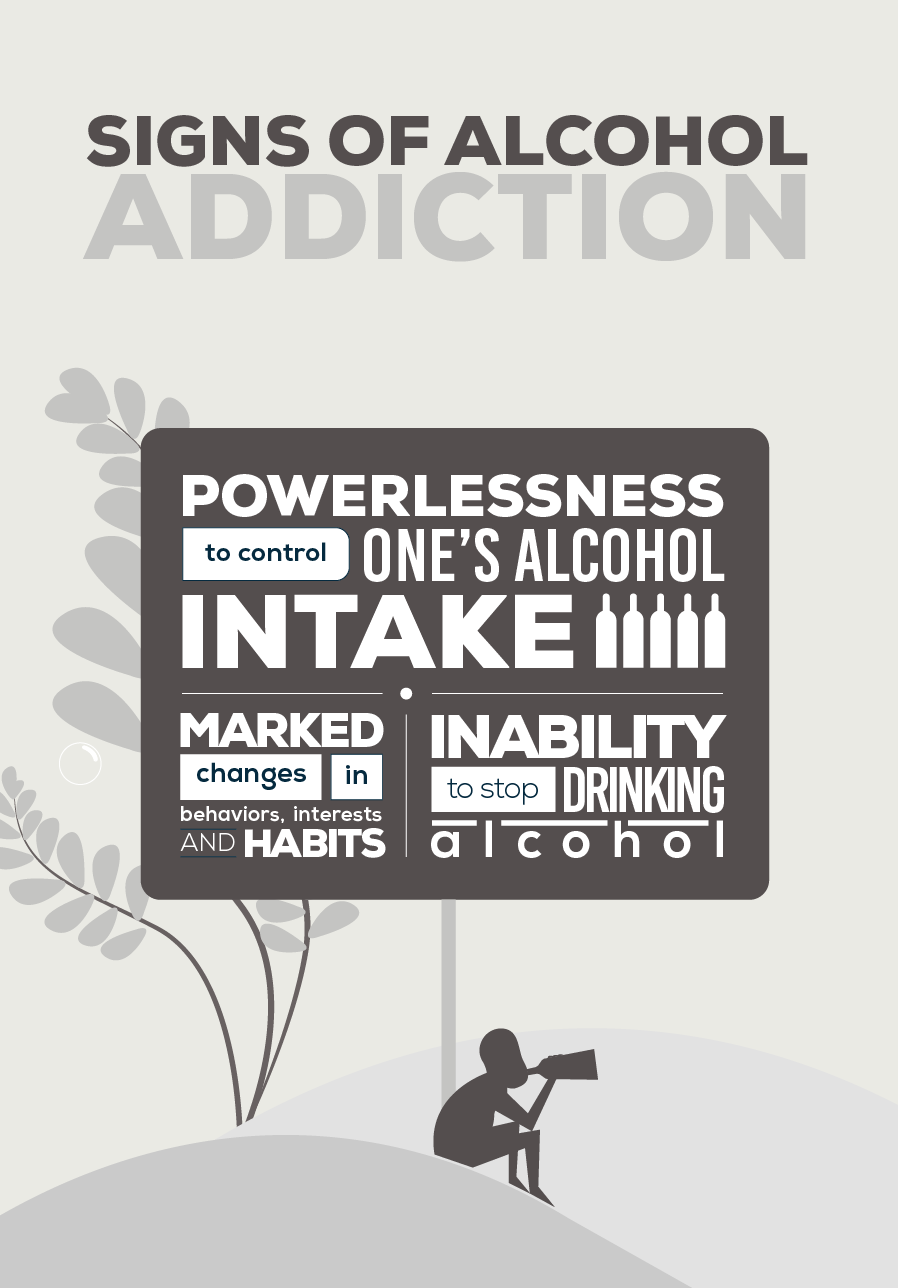
If you or someone you know exhibits two or more of the signs described above, then alcohol addiction has either already formed or is imminent. It is time to find the support you need and seek help.
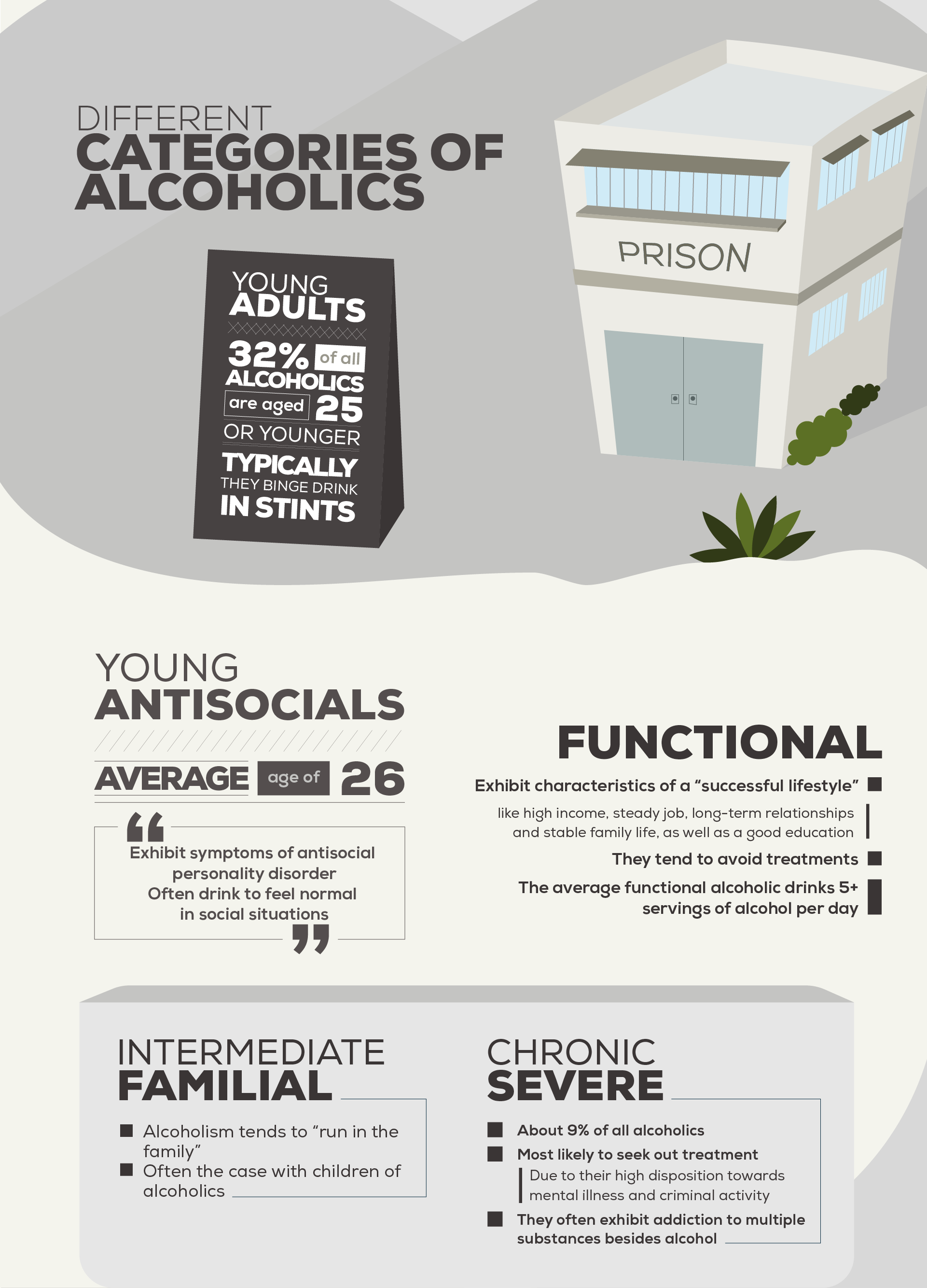
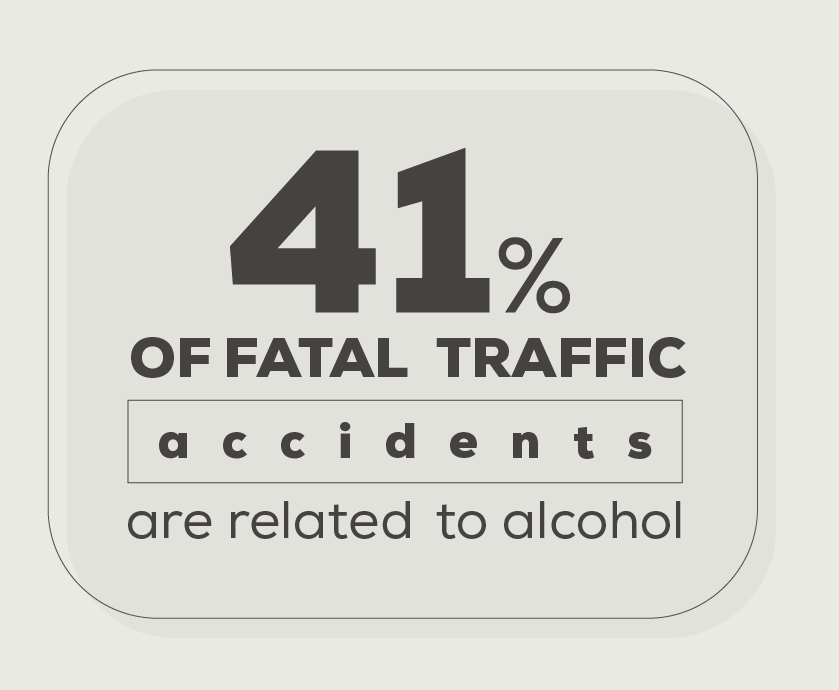
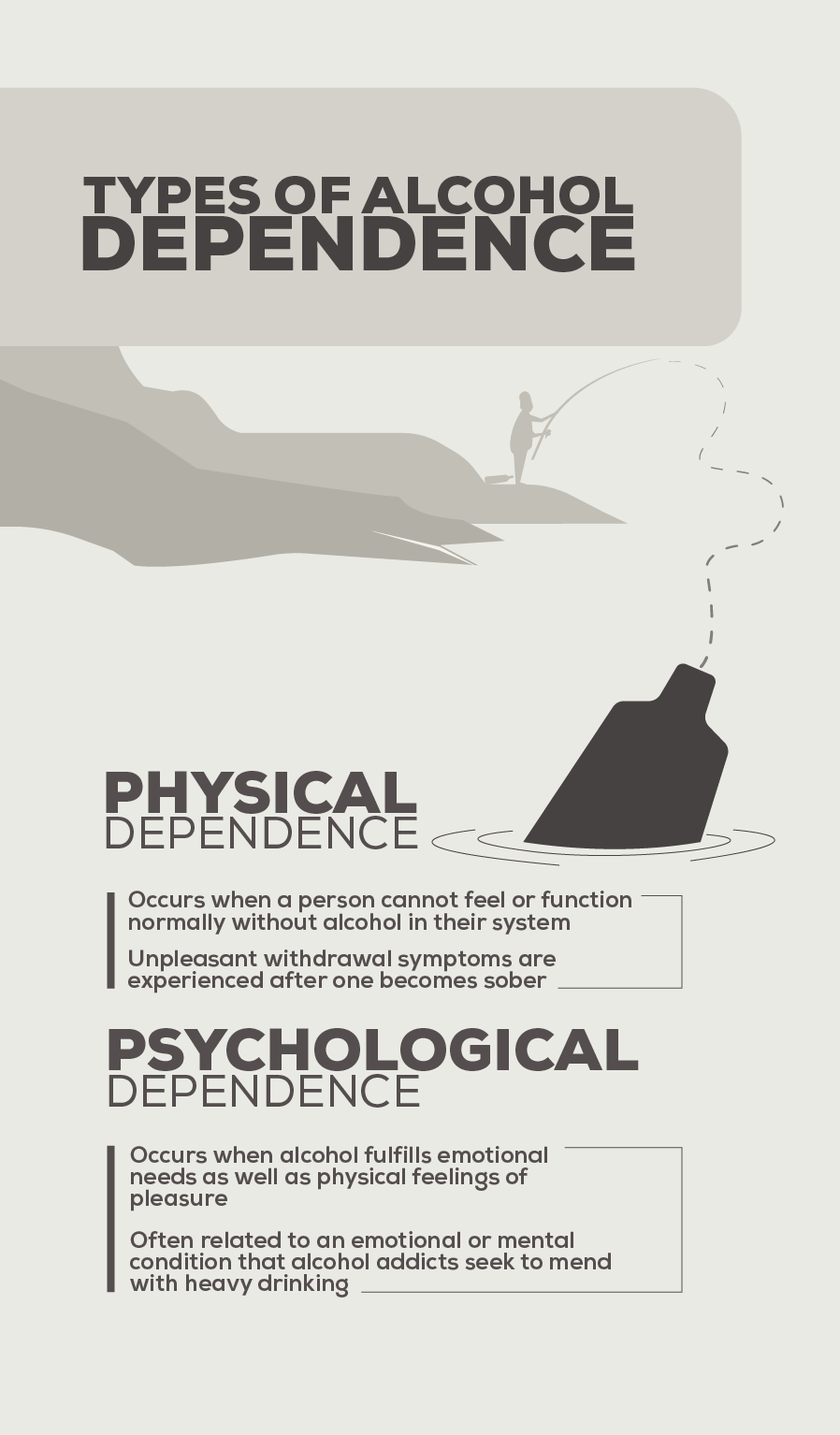
Not every alcoholic is created equal. In her moving TED speech on Alcohol Use Disorder recovery, actress Claudia Christian said,
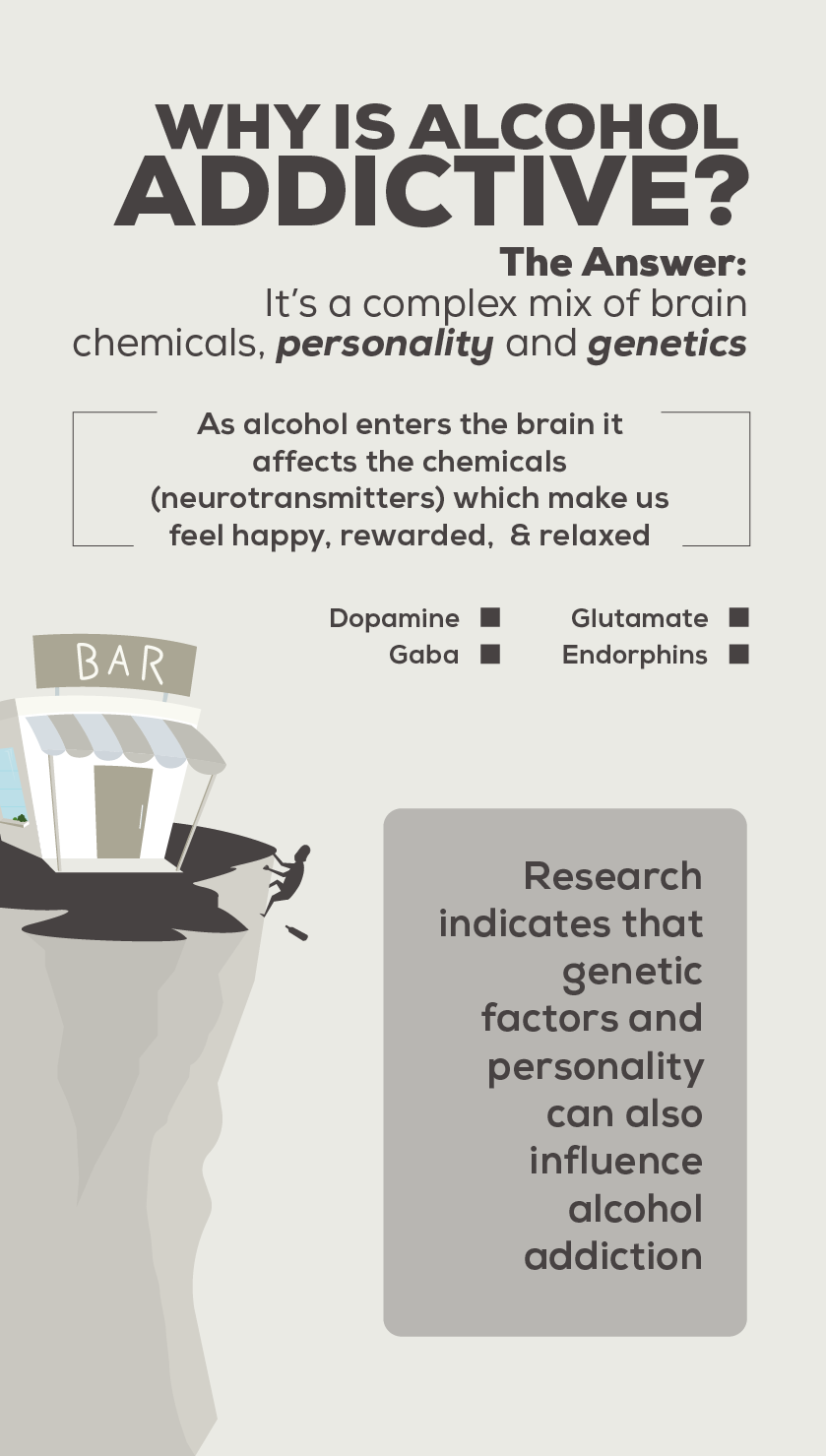
In other words, this disease can affect someone in any walk of life, no matter who or where they are, and alcoholism looks different on different people. Here are the most common types of Alcohol Use Disorder:
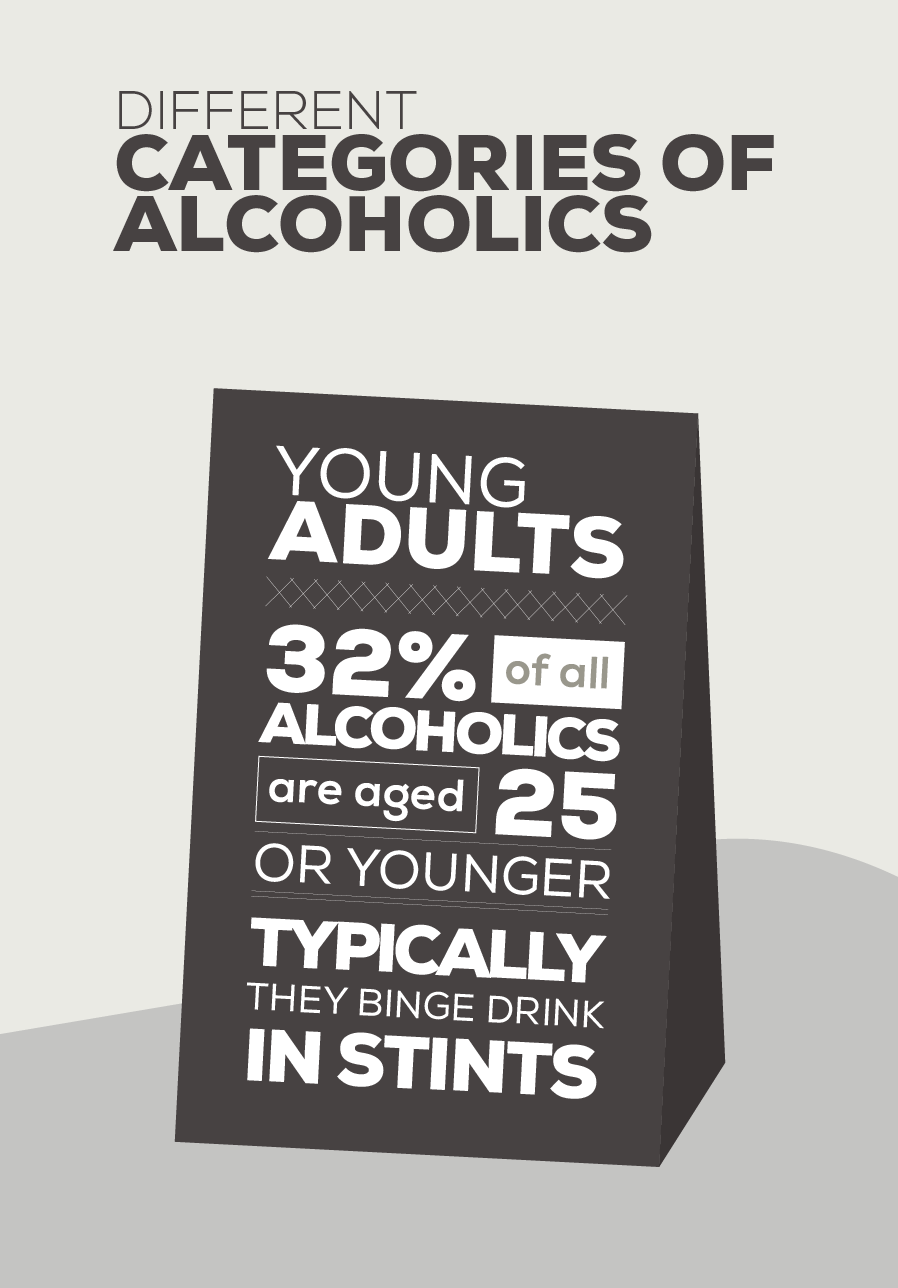
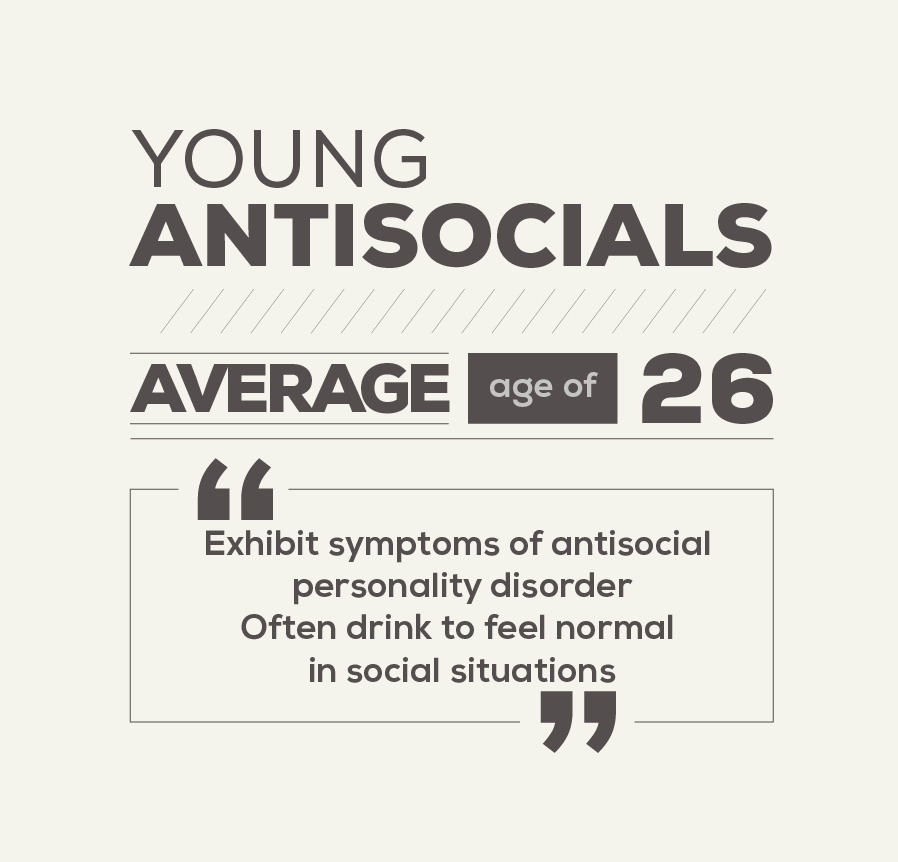
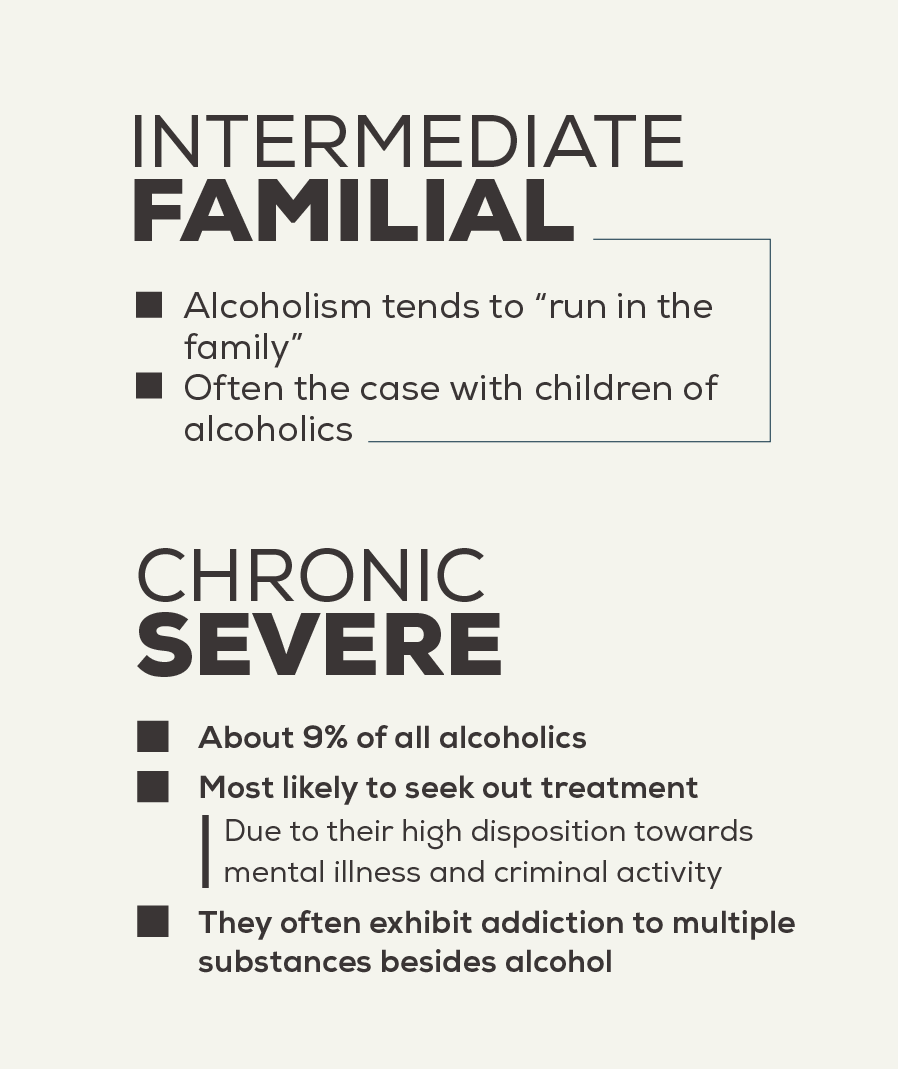
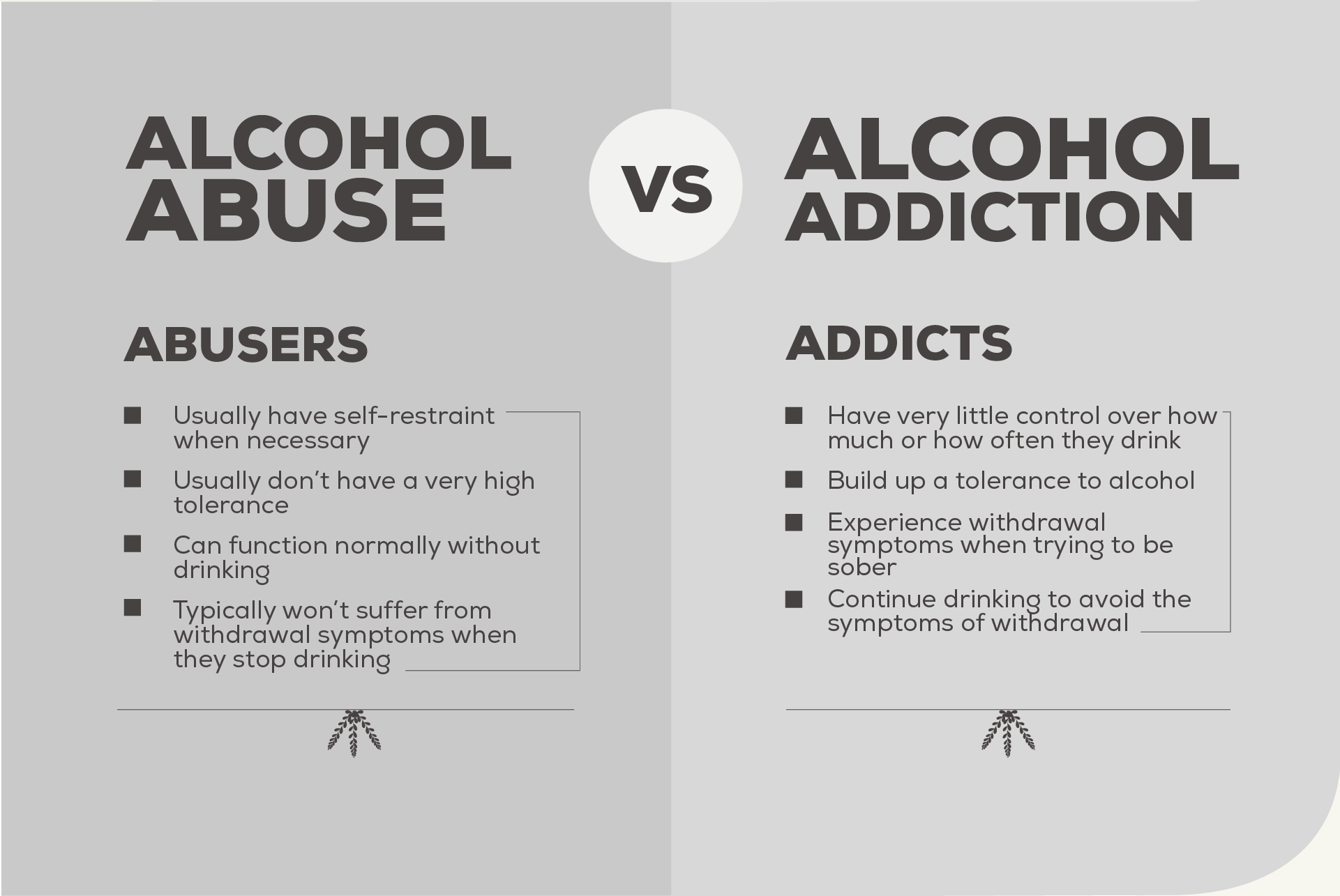
Although the two behaviors may look similar, alcohol abuse and alcohol addiction (dependence) are two different concepts. Alcohol abuse may certainly lead to addiction, but is defined by the DSM as the continued use of alcohol even after it has persistently created problems for work, family, or social life. Basically, if a drinking habit is causing problems, it is alcohol abuse, but that does not necessarily mean that a dependence to alcohol has formed. Here are some of the major differences between the two terms:
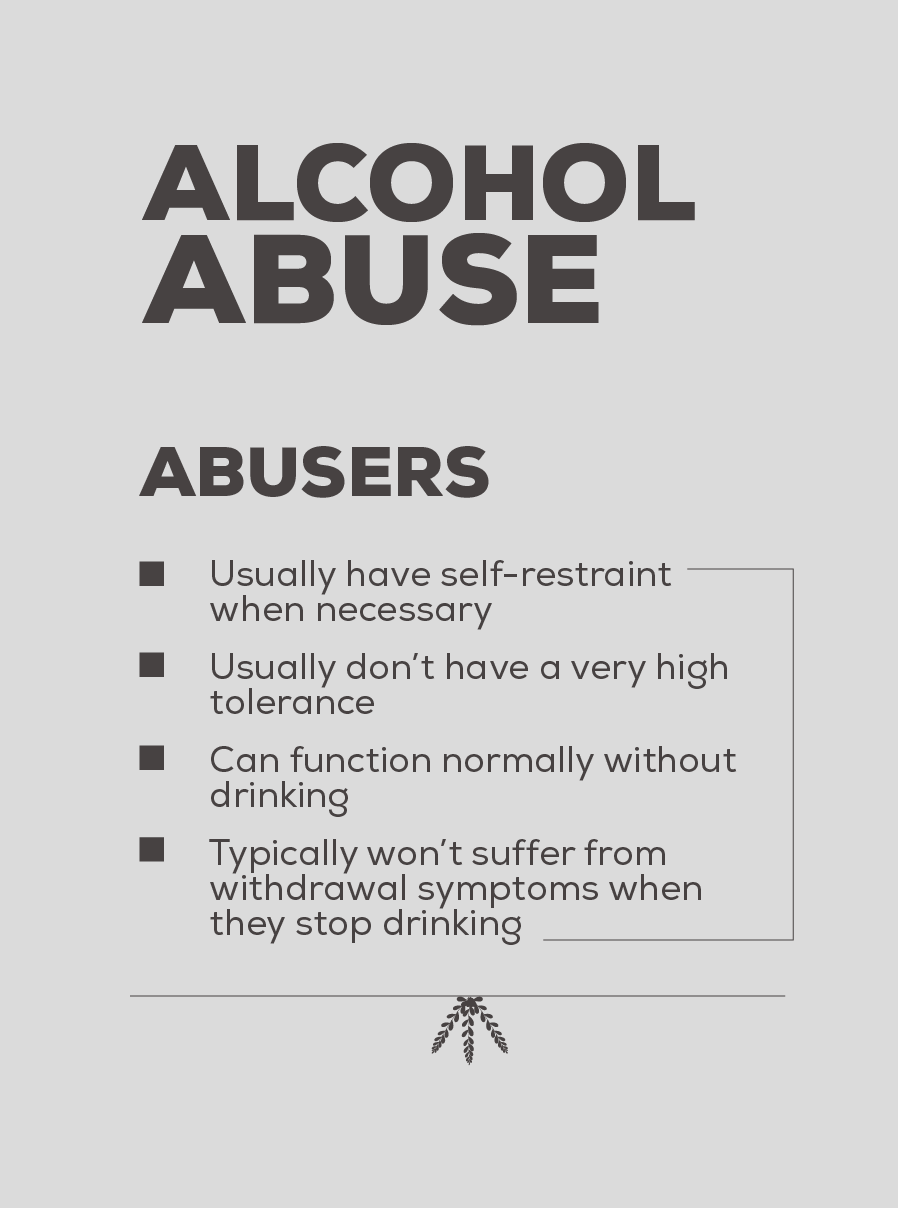
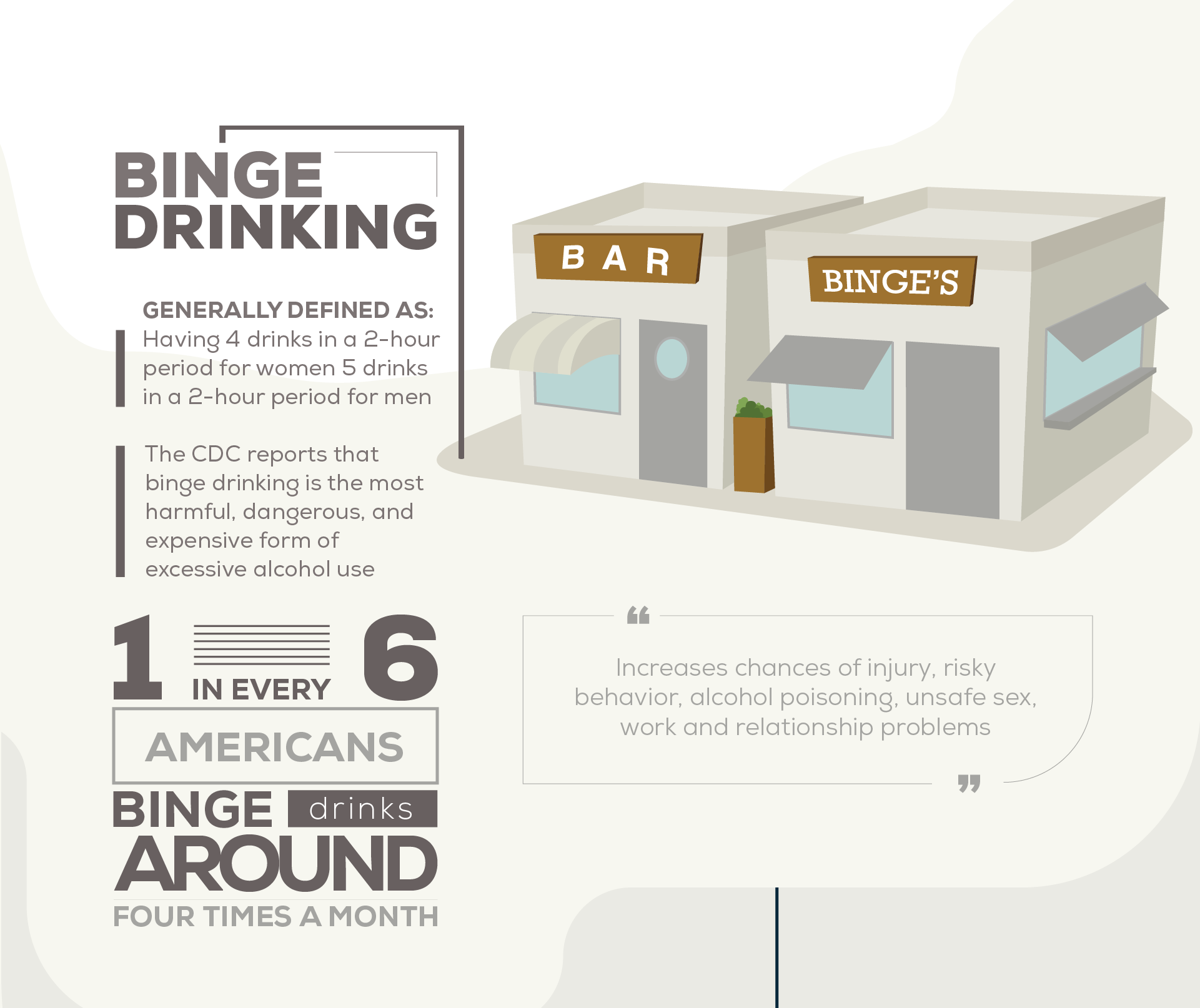
If you've determined that your own alcohol habit could be defined as abuse rather than addiction, don't go congratulating yourself just yet. Heavy drinking and/or binge drinking is still a dangerous and unhealthy behavior, but not only because it can easily lead to addiction. Consider the following alcohol-related statistics from the Centers for Disease Control and Prevention (CDC):
Even if one insists that "I only drink with friends," or "I only drink on the weekends," if they are drinking more than 4 or 5 drinks in a two-hour period, they are engaging in binge drinking, a risky behavior in and of itself. This kind of heavy drinking leads to dangerous activities like drunk driving or unprotected sex, and can cause a range of problems both socially and professionally.
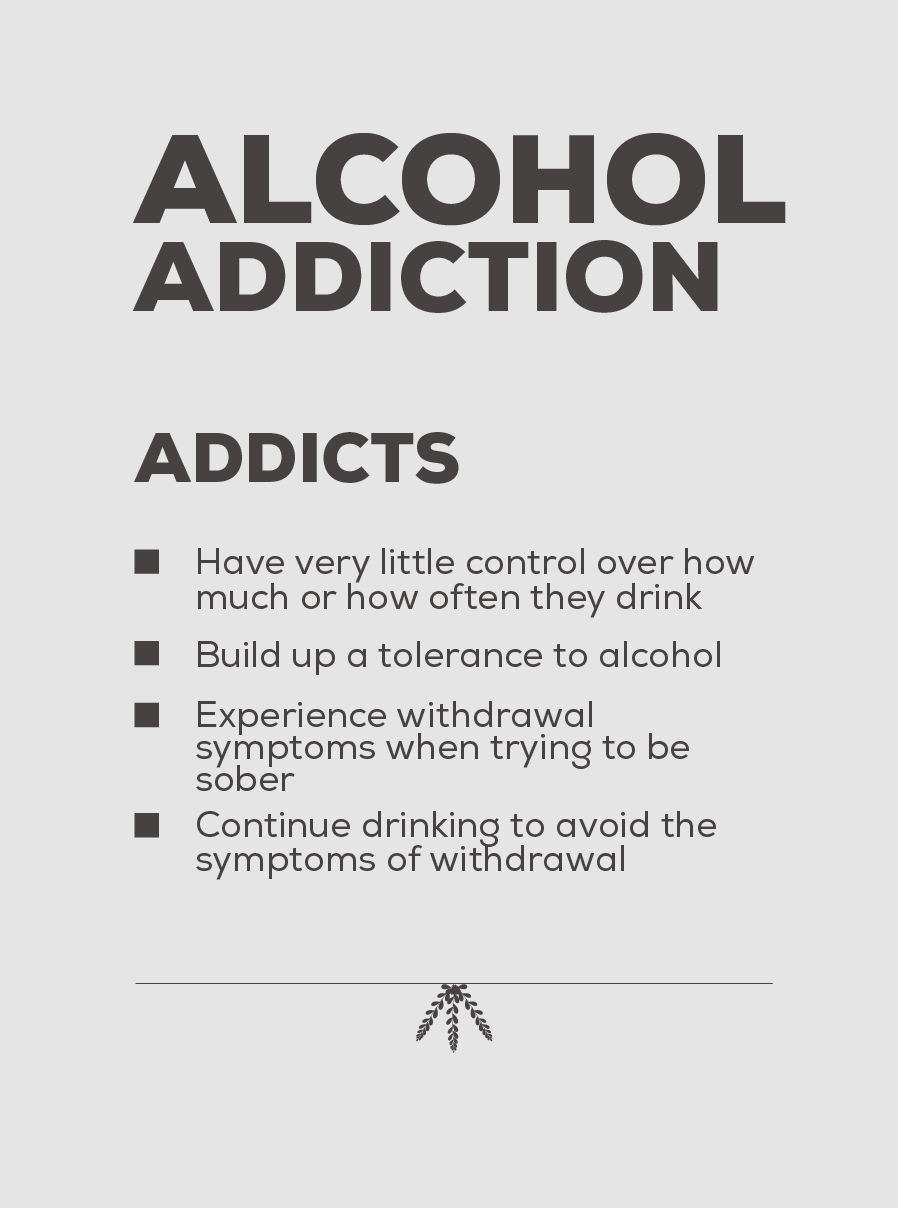
Whether you're an alcohol addict, alcohol abuser, or binge drinker, any type of heavy drinking - especially if it's on a weekly or monthly basis - is risky. If your drinking habit hasn't begun to cause any problems in your professional or personal life, it probably will soon. These behaviors are also indicators of developing a serious alcohol addiction in the future. Don't wait until alcohol abuse becomes a threat to your health and well-being; put an end to dangerous drinking behaviors and begin your alcohol detox program now.
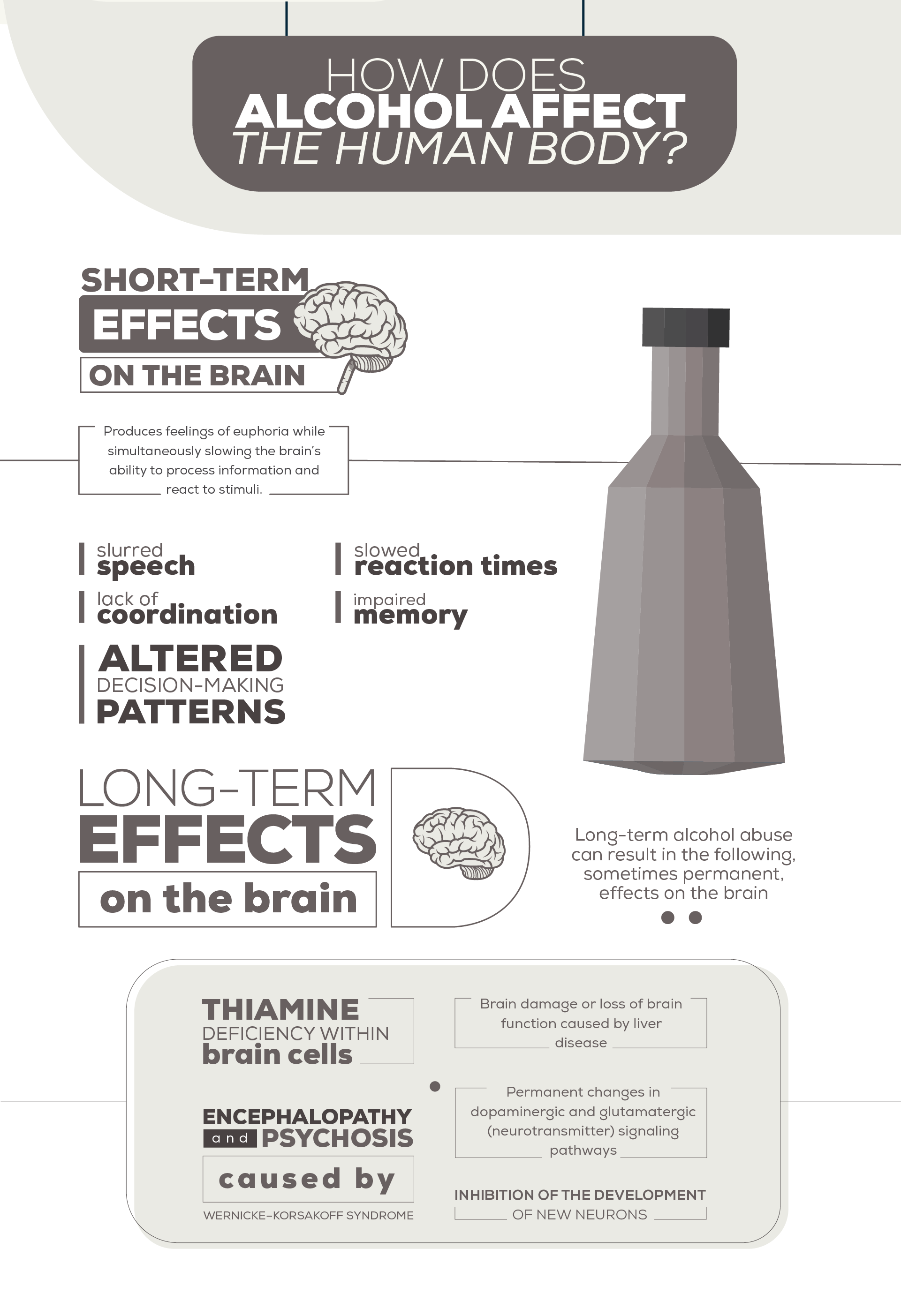
We've discussed how alcohol crosses the blood brain barrier directly into brain cells. The results are almost immediate as the ethanol affects a range of neurotransmitters, creating a feeling of euphoria while simultaneously producing a sedative effect on the CNS. These chemical reactions have both short-term effects that occur at the very first drink, and long-term effects if an individual drinks heavily over a long period of time.
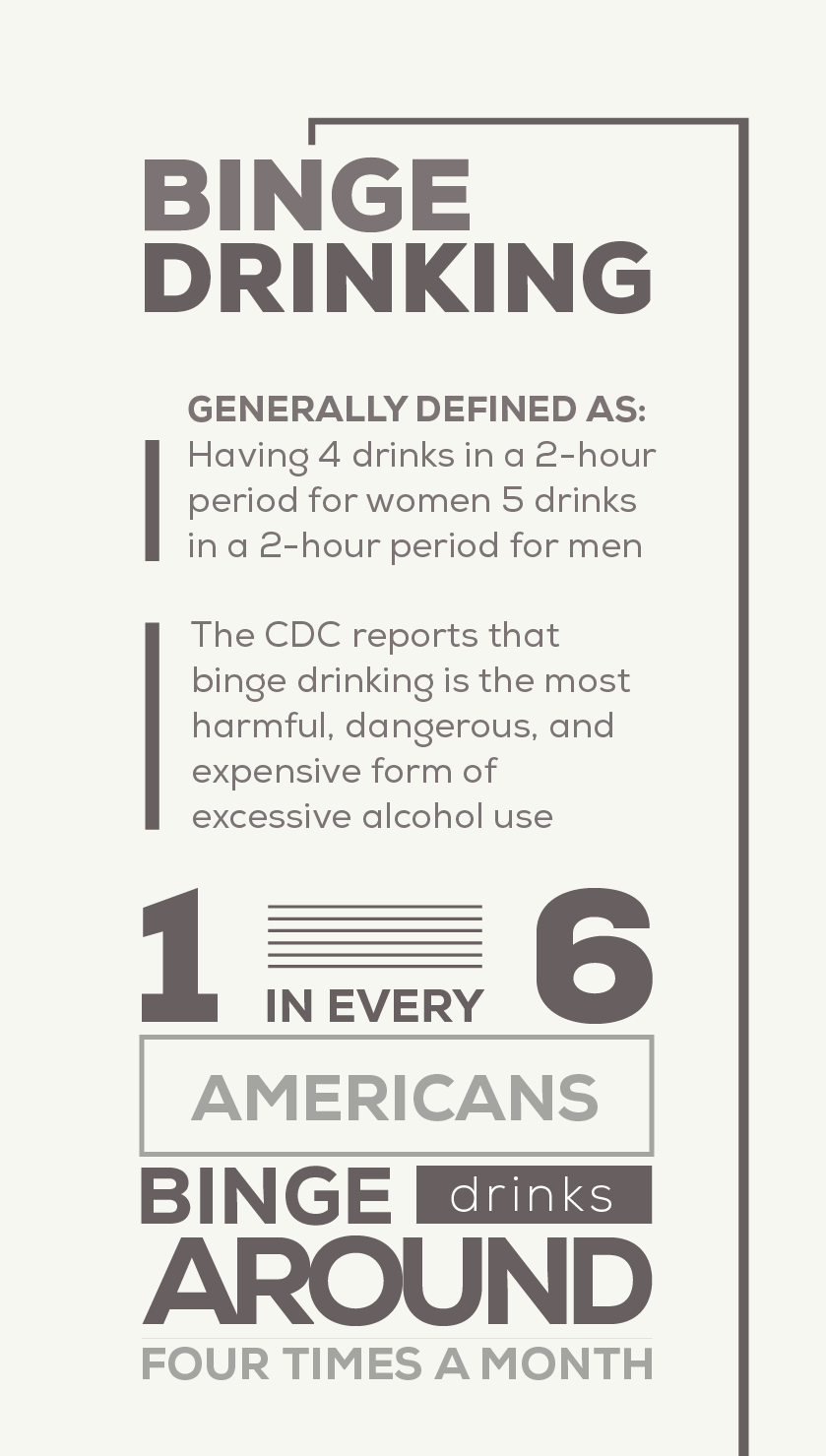
Short-Term Effects: Because of its impact on the Central Nervous System, alcohol will quickly create feelings of drowsiness and relaxation. This sedative effect also slows the brain's processes and reactions to stimuli, changes decision-making patterns, and impairs short-term memory.
Long-Term Effects: Alcohol abuse that persists over time has much more alarming consequences on the brain. Because of the imbalance of neurotransmitters that ethanol creates in the brain, its physical structure and function can be affected if the inflow of alcohol does not stop. Here are a few of the ways the brain is changed by long-term alcohol abuse:
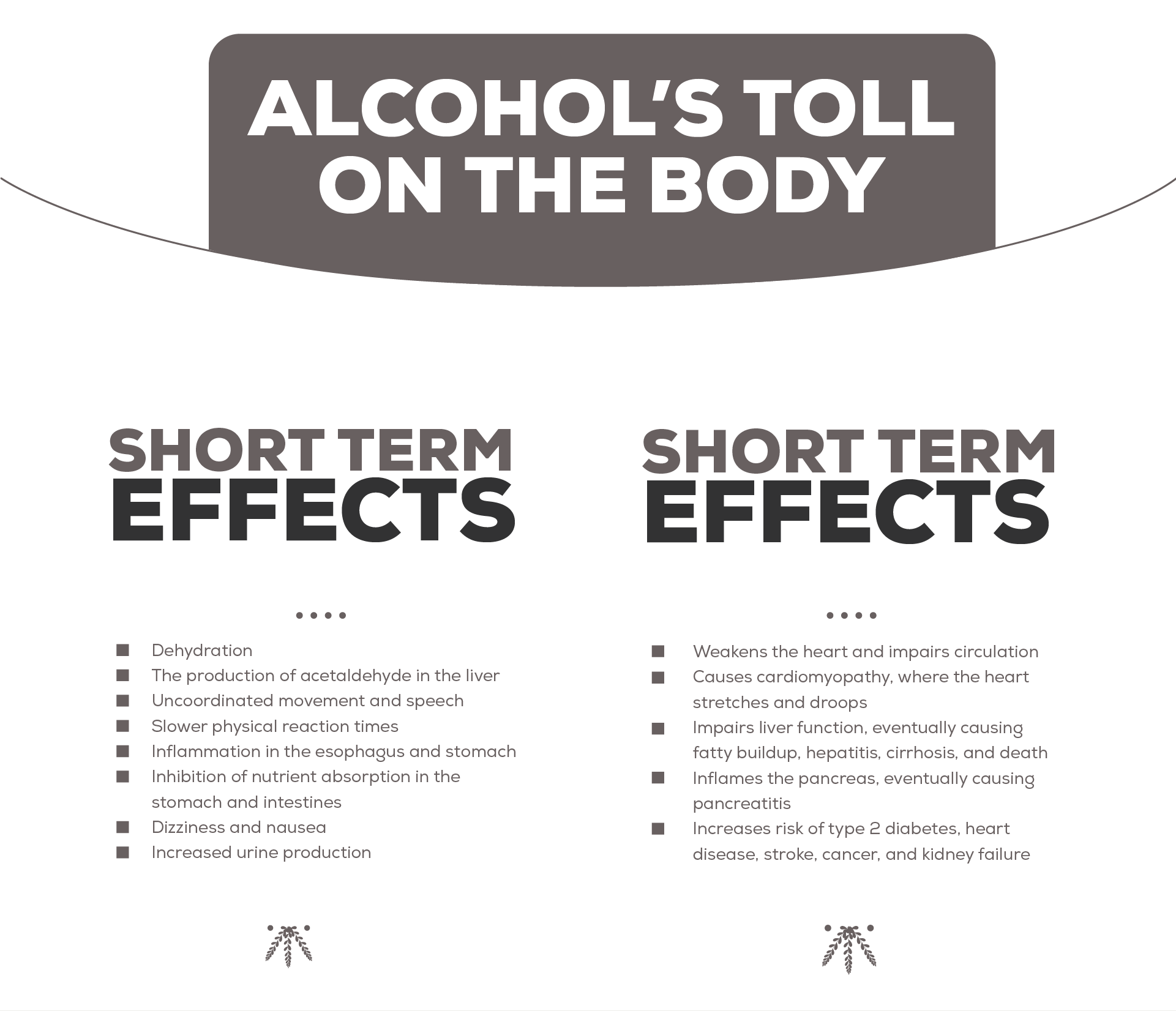
Despite the drastic effects that ethanol has on the brain, most alcohol-related deaths are not caused by damage to the brain. It is alcohol's devastating impact on internal organs that causes the most damage.
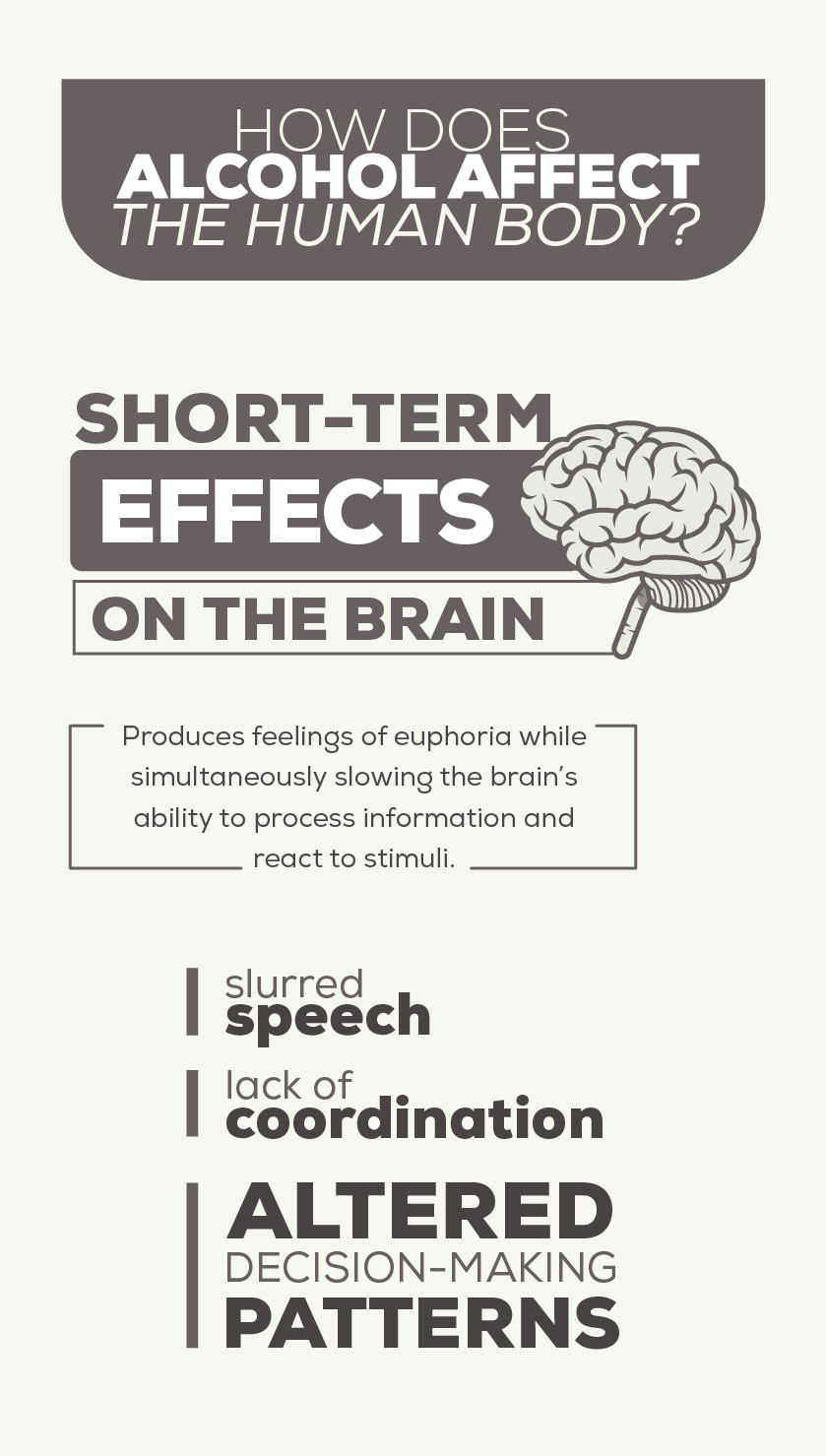
Short-Term Effects: Although it is not as obvious from the outside looking in, ethanol can begin to affect the body's organs very quickly. Let us count the ways:
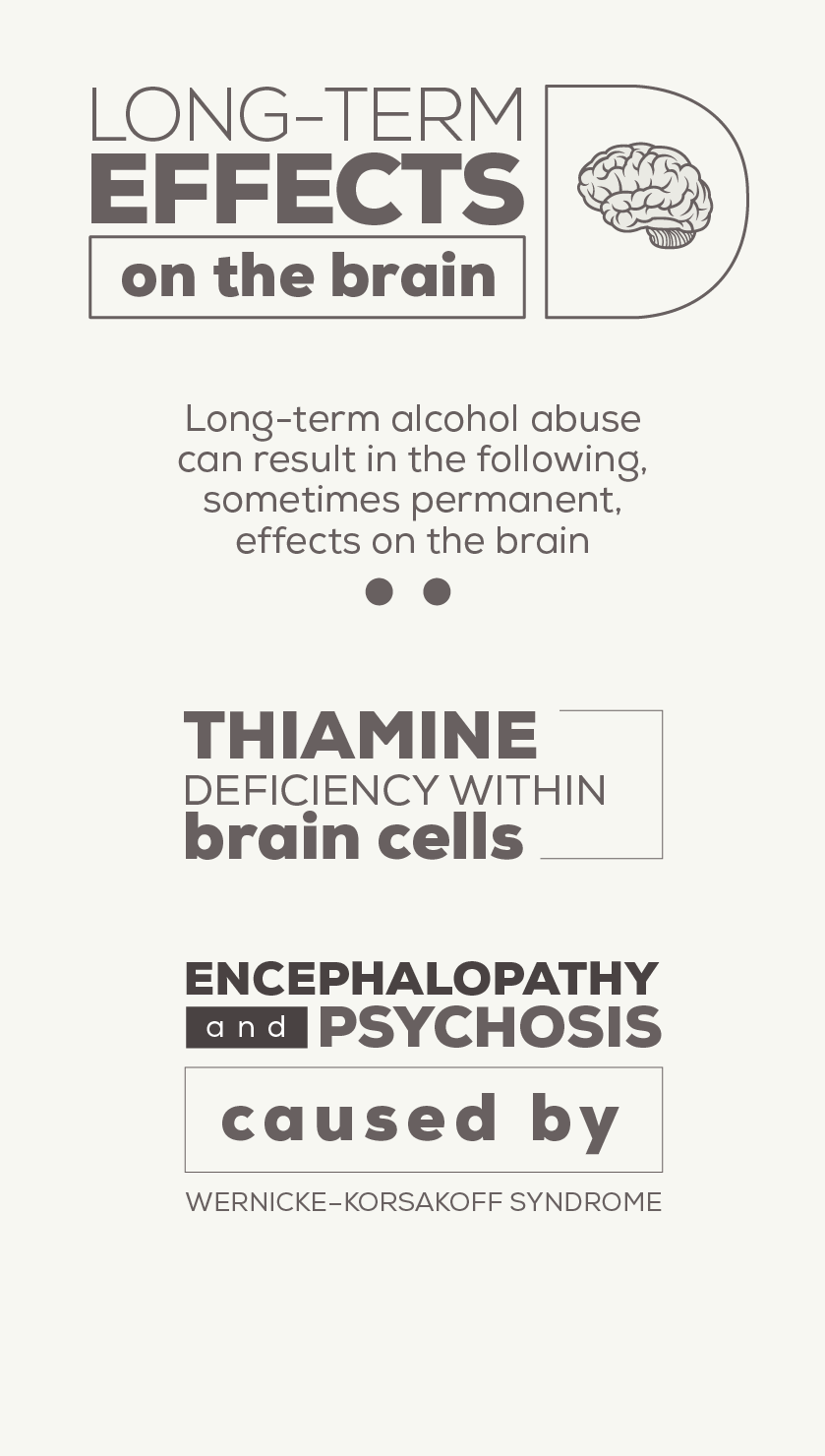
Long-Term Effects: Unfortunately, the ramifications of long-term alcohol abuse take the heaviest toll on the body and its organs. Organ damage due to alcohol is responsible for the most alcohol-related deaths. For example, heavy drinking over time will:
The answer to this question is largely dependent on the quantity of alcohol consumed and in what period of time. While an ounce of alcohol may be flushed out in an hour, it can take up to 6 hours for the bloodstream to cleanse itself of 5 or more drinks consumed within a two-hour period. Ethanol does not stay in the bloodstream, however. It can be detected on the breath for 24 hours, in urine up to 48 hours, and within hair fibers for up to 90 days.
A common misconception is that the body rids itself of alcohol toxins every hour, but this is only true if one ounce of alcohol has been consumed in that hour. In the case of heavy drinking or binge drinking over a short period of time, alcohol can remain active in the blood and brain for 6 - 8 hours. This misconception has been the cause of many bad decisions and dangerous situations.
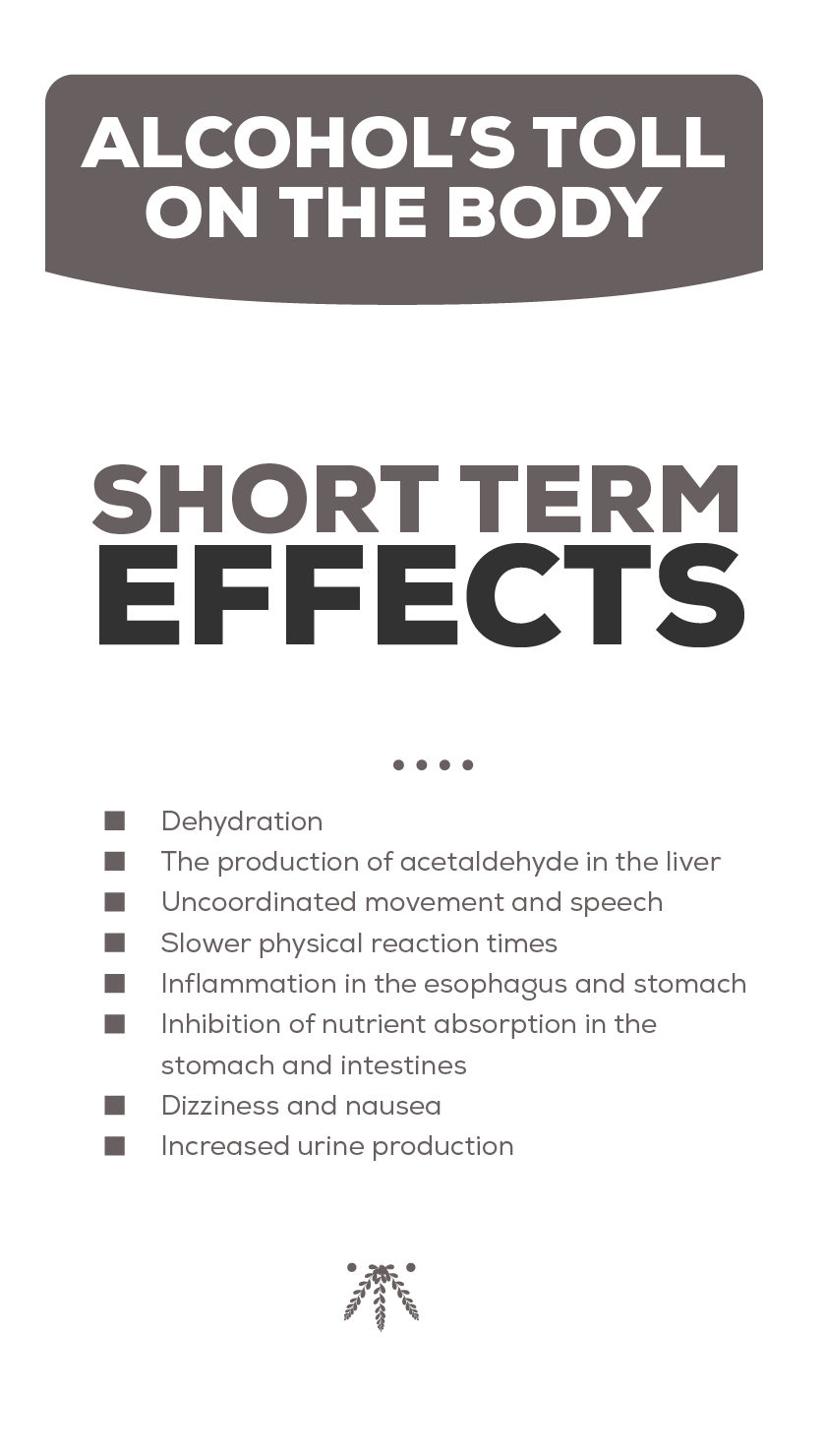
For example, if one believes that alcohol is flushed out every hour, they may feel it is safe to drive even though their blood alcohol content is still far higher than the legal limit. This kind of erroneous thinking has also been the cause of many a visit to the emergency room. People who believe that their body can digest alcohol quickly may drink dangerous amounts in a two or three hour period, a behavior that can easily result in alcohol poisoning. Six people die every day in the United States from alcohol poisoning.
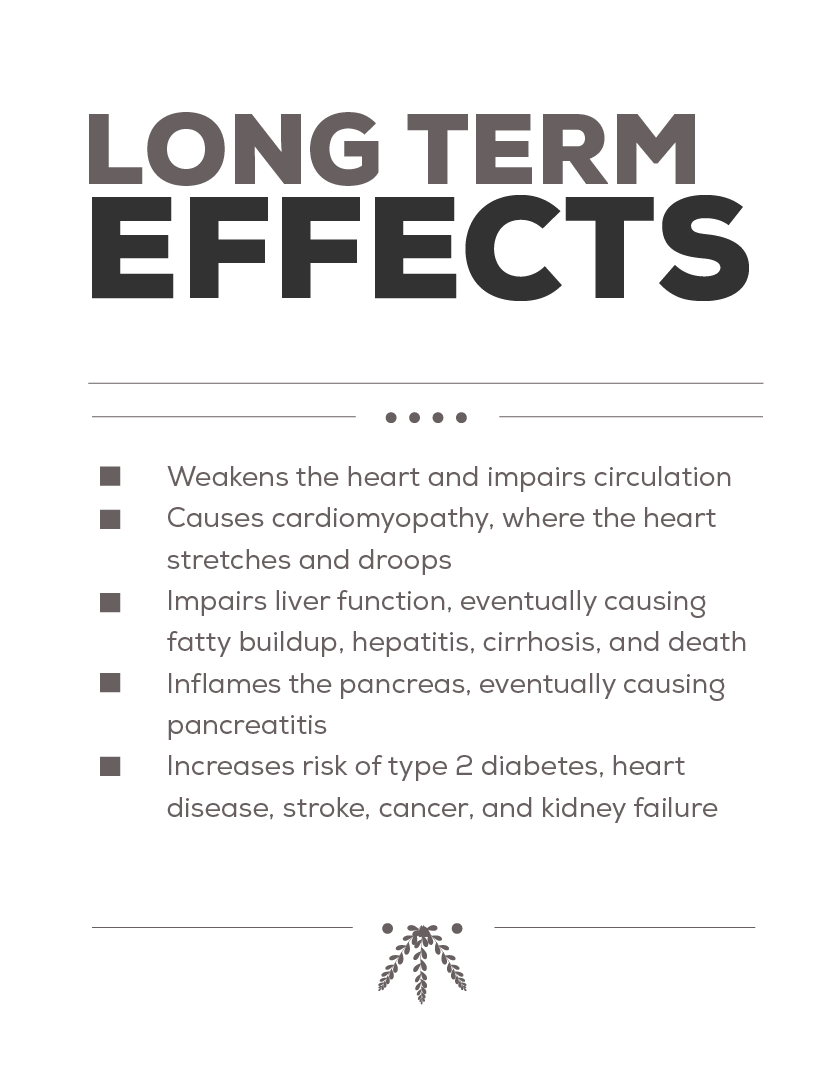
Since it can take up to 8 hours for alcohol to leave the bloodstream, this is usually the amount of time that passes before alcohol withdrawal symptoms kick in.
How many times have you skimmed headlines only to see the sad news of another overdose death? These stories often attribute the overdose to a combination of drugs and alcohol. In fact, this deadly combination is responsible for the most polysubstance abuse overdoses.
It's not hard to understand why. We already know that alcohol depresses the CNS. When you combine it with other sedatives like heroin or opioids, the effects are compounded and the body's most natural and vital functions begin to slow. It doesn't take much of this deadly combination to make the brain forget to tell the heart to beat regularly or the lungs to expand. Once this happens, overdose and/or death are imminent. 13% of all emergency room visits can be attributed to polysubstance abuse.
In addition to its lethal repercussions on the body, polysubstance abuse makes the recovery process even more grueling. Most other substances take longer for the human body to flush out, which accounts for an even longer detox period and a more drawn-out withdrawal process.
Anthony Hopkins described his addiction to alcohol as, "like being possessed by a demon… I couldn't stop."
Claudia Christian called it a monster, and Anthony Hopkins called it a demon. People talk about addiction in this way because, for an alcoholic, the disease is something dark, dangerous, and uncontrollable. In most cases, it is virtually impossible to outrun it or overpower it, to simply "stop drinking" without a great deal of support, help, and hard work.
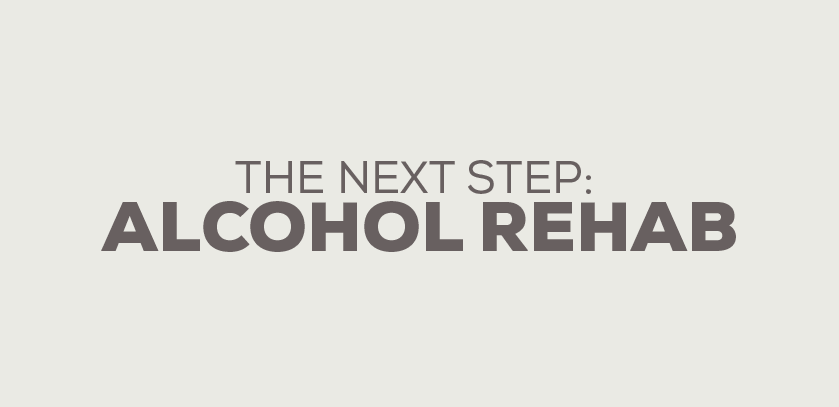
The first barrier is the pain and misery involved in the alcohol detox process itself. Alcohol withdrawal is so incredibly unpleasant that few people ever get through it without help. Some have compared the experience to dying. If you feel like you're dying and relief is only one sip away, it is easy to see why relapse is so common within the first days of alcohol detox. This is why it is recommended to have a strong support system and, ideally, medical personnel on hand before you begin.

"I finally said, you know what? I don't think I can continue doing this. I reached out for help, and I ran with it."
-Robert Downey Jr.
"Sobriety was the greatest gift I ever gave myself. I don't put it on a platform. I don't campaign about it. It's just something that works for me."
-Rob Lowe
"The mentality and behavior of drug addicts and alcoholics is wholly irrational until you understand that they are completely powerless over their addiction and unless they have structured help, they have no hope."
-Russell Brand
"Recovery is something you have to work on every single day.. It doesn't get a day off. "
-Demi Lovato
Each individual above suffered from severe addiction. Each one overcame it. In the words of Demi Lovato, recovery is something you have to work on every single day. It will not be easy. It will not be quick. But do you know what it will be?
It will be worth it.
Begin your recovery today; alcohol detox is the first step. The rest of your life awaits.

Our admissions coordinators are here to help you get started with treatment the right way. They'll verify your health insurance, help set up travel arrangements, and make sure your transition into treatment is smooth and hassle-free.
Contact Us